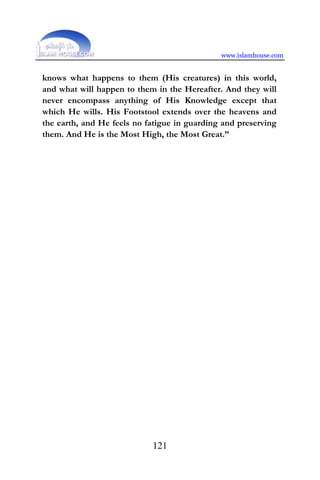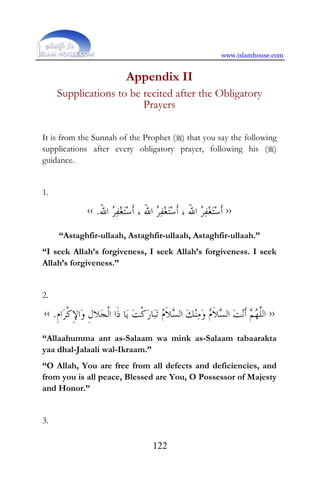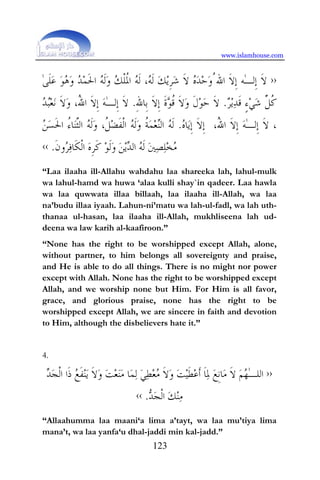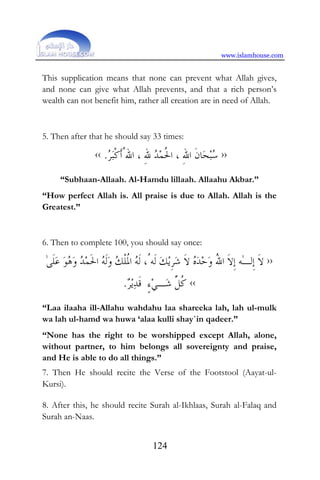This document provides guidance on how to become a Muslim by reciting the Shahadah. It explains the meaning and importance of the Shahadah, which declares there is no god but Allah and that Muhammad is His messenger. Reciting this testimony of faith with understanding of its meanings is sufficient to enter Islam. The document also shares verses from the Quran emphasizing Tawheed (monotheism), the significance of prophethood, and Allah's greatness and forgiveness.

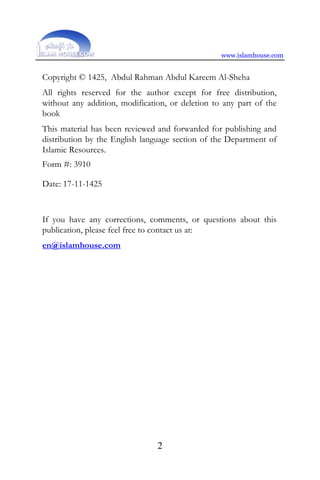
![www.islamhouse.com
3
ﺍﻟﺮﺣﻴﻢ ﺍﻟﺮﲪﻦ ﺍﷲ ﺑﺴﻢ
All praises are due to Allah, and may Allah exalt the praises and
send Peace upon our Prophet Muhammad, and upon his Family
and Companions.
To begin with, I would like to sincerely congratulate you from the
bottom of my heart, which loves you for the sake of Allah, for the
guidance Allah has granted and favored upon you to accept the
correct religion and to act according to it. I ask Allah that he keeps
us both, as well as all the Muslims, firm upon this great religion
until we meet Him, and not becoming apostate nor being put
through a trial.
Indeed a true Muslim feels great joy when someone accepts Islam,
for he wishes well for others and wants them to live as he does
himself: a life of comfort and delight with spiritual joy and mental
stability. This can only result from implementing the teachings of
Islam. Allah () says:
“Whoever works righteousness - whether male or female –
while he [or she] is a true believer, verily, to him we shall give
a good life, and we shall pay them certainly a good reward
according to the best of what they used to do.” [Surah an-Nahl
(16):97]
Allah () clarified the condition of those who do not believe in
Him and what He revealed. Allah () says:
“And whoever turns away from My Reminder, verily, for him
is a life of hardship, and We shall raise him up blind on the](https://image.slidesharecdn.com/enhowtobecomemuslim-171104225735/85/En-how-to_become_muslim-3-320.jpg)
![www.islamhouse.com
4
Day of Resurrection. * He will say, ‘O my Lord! Why have I
you raised me up blind, while [before] I had sight.’ * He
[Allah] will say, ‘Like this Our Aayaat [proofs, evidences,
verses, lessons, signs, revelations, etc.] came to you, but you
disregarded them, and so this Day, you will be neglected.’ ”
[Surah Taa-Haa (20):124-126]
A true Muslim also wishes that they live happily forever in the
Hereafter, whose delights are never-ending. Allah () says:
“Verily those who believe and do righteous deeds shall have
the Gardens of Firdaws (the highest level of Heaven) for their
entertainment. * Therein they shall dwell [forever]. No desire
will they have for removal therefrom.” [Surah al-Kahf (18):107-
108]
The end is inevitable; it is either eternal happiness or eternal
remorse. Whoever dies upon disbelief - and refuge is sought in
Allah - he will reside in Hellfire for eternity. Allah () says:
“Verily those who disbelieve from the people of the Book and
the polytheists will abide in the Fire of Hell. They are the
worst of creatures.” [Surah al-Bayyinah (98):6]
My noble brothers and sisters, indeed it is a great blessing and favor
of Allah that He has guided you to Islam and has saved you from
disbelief. There are many who have not been granted the guidance
to realize that Islam is the correct religion; and there are others who
have, but have not been granted the guidance to follow it. You must
thank Allah, my brothers and sisters, for this favor from Allah and
this sacred gift which He has chosen for you over others. Ask Allah
that He keeps you firm upon this religion until you meet Him. Allah
() says:](https://image.slidesharecdn.com/enhowtobecomemuslim-171104225735/85/En-how-to_become_muslim-4-320.jpg)
![www.islamhouse.com
5
“They regard as a favor to you [O Muhammad ()] that they
have embraced Islam Say, ‘Count not your Islam as a favor to
me. Nay but Allah has conferred a favor upon you that He has
guided you to the Faith, if you indeed are true.’ ” [Surah al-
Hujuraat (49):17]
We are all humans, and all humans are in dire need of Allah. Allah
() says:
“O Mankind! It is you who stand in need of Allah. But Allah is
Rich (Free of all needs), Worthy of all praise.” [Surah al-Faatir
(35):15]
Allah () is in no need of us: He neither benefits from our
obedience and worship, nor is He harmed by our disbelief and
disobedience. Allah () says:
“If you disbelieve, then verily Allah is not need of you, He
likes not disbelief for His slaves. And if you are grateful [by
being believers] He is pleased with that for you.” [Surah az-
Zumar (39):7]
The Messenger of Allah () said in a Hadeeth Qudsi1,
“Allah said: ‘O My servants! I have forbidden dhulm
(oppression and injustice) for Myself, and I have made it
forbidden amongst you, so do not oppress one another. O My
servants, all of you are astray except those whom I have
guided, so seek guidance from Me and I shall guide you. O
My servants, all of you are hungry except those whom I have
1 Hadeeth Qudsi: A hadeeth is a narration of the speech, actions, tacit
approvals, and characteristics of the Prophet (). A Hadeeth Qudsi is a
hadeeth in which the Prophet () narrates from Allah in the first person (I).](https://image.slidesharecdn.com/enhowtobecomemuslim-171104225735/85/En-how-to_become_muslim-5-320.jpg)
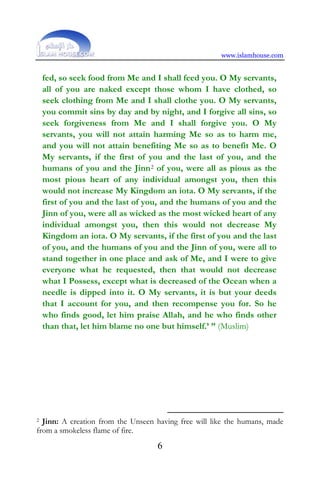
![www.islamhouse.com
7
How Does One Enter the Fold of Islam?
In order to enter the fold of Islam and become a Muslim, there are
no specific religious rituals or customs that one need to perform,
neither in specific areas nor in front of specific people. This is due
to the fact that Islam is a direct relationship between the slave and
His Lord without any intermediaries. Also one does not need to
exert great efforts [to enter its fold], he merely needs to utter a few
words which are easy on the tongue but very weighty in meaning.
One who has decided to become Muslim says the following words
in order to enter the fold of Islam, which is called the
‘Shahaadataan’3:
“Ash-hadu an laa ilaaha ill-Allah, wa ashhadu anna
Muhammadan ‘abd-ullahi wa rasooluh.
“I testify that there is no true deity except Allah, and I testify
that Muhammad is His slave and Messenger.”
This statement is the key to the door of Islam. Whoever utters it
shuns all other religions besides Islam and all beliefs which differ
from it. Through this statement, he receives the rights which all
other Muslims receive, and he must fulfill the rights which all other
Muslims must fulfill. His wealth, honor and blood become
consecrate and protected, except for those cases in which the
Islamic law needs to intercede. It is true that one is regarded to be a
Muslim by what is outward and apparent and that only Allah knows
what is truly in his heart, but one must know the meanings found in
the Shahaadataan.
3 Shahaadatan: Literally, the two testimonies.](https://image.slidesharecdn.com/enhowtobecomemuslim-171104225735/85/En-how-to_become_muslim-7-320.jpg)
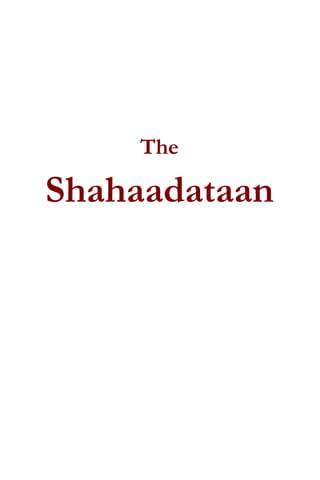
![www.islamhouse.com
9
The Meaning of Laa Ilaaha Ill-Allah
This is the phrase of Tawheed4. Due to this concept Allah brought
the creation into being, and due to this concept He created Paradise
and Hellfire. Allah () says:
“And I have neither created the Jinn nor humans except to
worship Me.” [Surah adh-Dhaariyaat (51):56]
This is the belief which all the Prophets and Messengers called to,
from Adam, the first Prophet, to Muhammad, the last messenger,
may the Safety and Blessings of Allah be upon them all. Allah ()
says:
“And we have not sent before you any messenger except that
We have revealed to him that there is no deity that is
worshipped in truth except Me, so worship and obey Me.”
[Surah al-Anbiyaa (10):25]
The Meanings of the Shahaadah:
• There is no Creator of this existence except Allah. Allah () says:
“Such is Allah, your Lord! Laa ilaaha illa Huwa (none has the
right to be worshipped but He), the Creator of all things. So
worship and obey Him (Alone), and He is the Wakeel
(Trustee, Disposer of affairs, Guardian, etc.) over all things.”
[Surah al-An‘aam (6):102]
4 Tawheed: The concept of the Oneness and Uniqueness of Allah.](https://image.slidesharecdn.com/enhowtobecomemuslim-171104225735/85/En-how-to_become_muslim-9-320.jpg)
![www.islamhouse.com
10
• There is no True Master and Owner present in this existence
except Allah.5 Allah () says:
“Surely, His is the Creation and Commandment. Blessed be
Allah, the Lord of the ‘aalameen (mankind, Jinns and all that
exists)!” [Surah al-A’raaf (7):54]
• No deity deserves servitude and worship except Allah.6 Allah says:
“No doubt! Verily, to Allah belongs whosoever is in the
heavens and whosoever is in the earth. And those who worship
and invoke others besides Allah, in fact, follow not the (Allah’s
so-called) partners, they follow only a conjecture and they only
invent lies.” [Surah Yunus (10):66]
• All the Names and Attributes of Allah are perfect and complete.7
He is high above and free from all faults and shortcomings. Allah
() says:
“And (all) the Most Beautiful Names belong to Allah, so call
on Him by them, and leave the company of those who belie or
deny (or utter impious speech against) His Names. They will
be requited for what they used to do.” [Surah al-A’raaf (7):180]
5 Point number one and two is the concept known as Tawheed ar-
Ruboobiyyah, or the Oneness of Allah in His Attributes of Lordship. This is
the belief that there is no Creator, Sovereign Master, Administrator, Provider,
Sustainer, and Owner except for Allah.
6 This is concept is known as Tawheed al-Uloohiyyah, or the Oneness of
Allah in His Worship. This is the belief that no worship should be directed to
any except Allah.
7 This concept is known as Tawheed al-Asmaa´ was-Sifaat, that Allah has all
the Best of Names and Attributes, and that there are none equal, comparable
to, or like them.](https://image.slidesharecdn.com/enhowtobecomemuslim-171104225735/85/En-how-to_become_muslim-10-320.jpg)
![www.islamhouse.com
11
The Conditions of the Shahaadah
It is not enough that one merely utter the Shahaadah for it to be
accepted by Allah. It is the key to the gates of Paradise, but in order
for it to work, it needs to have the right ridges. The Shahaadah must
meet the following conditions for it to be accepted by Allah:
1) Knowledge: One must have knowledge that all other deities
worshipped besides Allah are false, so there is no deity worshipped
in truth except Allah. Never should anyone else be worshipped,
even if he be a prophet, a messenger or an angel. Allah is the only
one who deserves all types worship, such as prayer [Salaah],
supplication (du‘aa), hope, sacrificial slaughtering, making oaths, etc.
Whoever directs any type of worship to other than Allah has
committed kufr8, even if he uttered the Shahaadataan.
2) Certainty: One must have certainty in the Shahaadah. Certainty
is the opposite of doubt, so there is no room for a person to doubt
or waver in his belief. Allah () says:
“The believers are only those who have believed in Allah and
His Messenger, and afterward doubt not, and strive with their
wealth and their lives for the Cause of Allah. Those! They are
the truthful.” [Surah al-Hujuraat (49):15]
3) Acceptance: One should accept the Shahaadah fully and not
reject it.9 Allah () says:
8 Kufr: Disbelief.
9 It is not sufficient that a person merely know what the Shahaadah means and
believe it with certainty. Rather he must accept it my pronouncing it openly
and accepting to become a Muslim.](https://image.slidesharecdn.com/enhowtobecomemuslim-171104225735/85/En-how-to_become_muslim-11-320.jpg)
![www.islamhouse.com
12
“Truly, when it was said to them, “Laa ilaaha ill-Allah (no
deity is worshipped in truth except Allah),” they puff
themselves up with pride and deny it.” [Surah as-Saffaat (37):35]
4) Compliance, obedience and acting upon all what the Shahaadah
necessitates.10 A person must do according to what Allah ordered
and abstain from what He prohibited. Allah () says:
“And whosoever submits his face to Allah, while he is a
Muhsin11 (doer of good), then he has grasped the most
trustworthy handhold [La ilaha ill-Allah]. And to Allah return
all matters for decision.” [Surah Luqman (31):22]
5) Truthfulness: One must be truthful in his shahaadah.12 Allah
() says:
“They say with their tongues what is not in their hearts.”
[Surah al-Fat-h (48):11]
6) Sincerity of worship: One must make his worship and
obedience sincerely for Allah alone.13 Allah () says:
10 It is not sufficient that a person merely know what the Shahaadah means
and believe in it with certainty, accept it by pronouncing it and accept to
become a Muslim, but moreover, he must act according to it.
11 Muhsin: Literally, a person who does something well. Here it means one
who does righteous deeds sincerely for Allah, according to the method the
Prophet () taught us. Here we see that Allah mentions both submission to
Allah along with doing righteous deeds, and only if a person does this has he
grasped onto the sure handhold of the Shahaadah.
12 Even though a person may be doing all these things on the outside, he might
be hiding disbelief in his heart, like the hypocrites.
13 It may be that one fulfills all the previous conditions, but he directs worship
to other than Allah at times, like supplicating to the dead, etc. He has not made
his worship purely for Allah.](https://image.slidesharecdn.com/enhowtobecomemuslim-171104225735/85/En-how-to_become_muslim-12-320.jpg)
![www.islamhouse.com
13
“And they were not commanded except to worship Allah,
following the religion purely and sincerely for Him, turning
away from other religions.” [Surah al-Bayyinah (98):5]
7) Love: One must love Allah, His Messenger, and His righteous
slaves. He must hate and show enmity towards all who show enmity
to Allah and His Messenger. He must prefer what Allah and His
Messenger love, even if it is different to what he desires. Allah ()
says:
“Say: If your fathers, your sons, your brothers, your wives,
your kindred, the wealth that you have gained, the commerce
in which you fear a decline, and the dwellings in which you
delight… are dearer to you than Allah and His Messenger,
and fighting in His Cause, then wait until Allah brings about
His Decision (torment). And Allah guides not the people who
are faasiqoon (the rebellious and disobedient to Allah).”
[Surah at-Tawbah (9):24]
The Shahaadah also necessitates that Allah is the only one who has
the right to legislate, whether it be in matters concerning worship,
or matters concerning the government of human relations in both
the individual and public affairs. The act of making something
prohibited or lawful is for Allah alone. His Messenger () merely
explained and clarified Allah’s commandments. Allah () says:
“And whatsoever the Messenger gives you, take it, and
whatsoever he forbids you, abstain (from it).” [Surah al-Hashr
(59):7]](https://image.slidesharecdn.com/enhowtobecomemuslim-171104225735/85/En-how-to_become_muslim-13-320.jpg)
![www.islamhouse.com
14
The Fruits of having Eemaan14 (Belief) in Allah
1) In realizing and implementing the Shahaadah fully, one frees
himself from the worship of humanity and instead worships his
only Lord and God. In doing so, one ceases to be dependent upon
the creation, whether in worship, fear, hope, and the likes. Allah
() says:
“Say: ‘Tell me then, the things that you invoke besides Allah,
if Allah intended some harm for me, could they remove His
harm, or if He (Allah) intended some mercy for me, could they
withhold His Mercy?’ Say: ‘Sufficient for me is Allah; in Him
those who trust (i.e. believers) must put their trust.’ ” [Surah
az-Zumar (39):38]
2) Peace of heart, mind and soul. Allah () says:
“Those who believe (in the Oneness of Allah - Islamic
Monotheism), and whose hearts find rest in the remembrance
of Allah, Verily, in the remembrance of Allah do hearts find
rest.” [Surah ar-Ra’d (13):28]
3) The sense of security which is realized through the knowledge
that there is someone to turn to in times of hardship. Allah ()
says:
“And when harm touches you upon the sea, those that you call
upon besides Him vanish from you except Him (Allah Alone).
But when He brings you safely to land, you turn away (from
Him). And man is ever ungrateful.” [Surah al-Israa´ (17):67]
14 The word Eemaan is usually translated as belief, but in reality has a wider
meaning, for it entails internal belief, as well as outer speech and deeds. If a
person was to ‘believe’ in Islam without ever acting upon it, it would not be
said that he has ‘Eemaan’ and therefore his ‘belief’ would not be accepted.](https://image.slidesharecdn.com/enhowtobecomemuslim-171104225735/85/En-how-to_become_muslim-14-320.jpg)
![www.islamhouse.com
15
4) The spiritual joy which one feels in worshipping Allah. This is
due to the fact that the goal which he is trying to achieve (Paradise)
cannot be reached except after death. So you see him persistently
striving to achieve this goal by doing righteous deeds, rendering
servitude sincerely and purely to Allah alone. Allah () says:
“Say: ‘Verily, my Salaah (prayer), my sacrifice, my living and
my dying are for Allah, the Lord of the ‘aalameen (mankind,
Jinns and all that exists). He has no partner. * And of this I
have been commanded, and I am the first of the Muslims.’ ”
[Surah al-An‘aam (6):162-163]
5) The Guidance and Success which is granted by Allah to those
that believe in Him. Allah () says:
“…and whosoever believes in Allah, He guides his heart [to
the true Faith with certainty], and Allah is the All-Knower of
everything.” [Surah at-Taghaabun (64):11]
6) The love of righteousness and its propagation amongst the
masses. Allah () says:
“So whosoever does good equal to the weight of an atom (or a
small ant), shall see it.” [Surah al-Zilzaal (99):7]
The Prophet () said:
“Indeed the one who leads another to do a righteous deed is
like the one who actually does it out (i.e. he will receive the
same reward).” (Tirmidhi)
One who has Eemaan in Allah must also have Eemaan in all the
things which He has informed us, and from them are the following:](https://image.slidesharecdn.com/enhowtobecomemuslim-171104225735/85/En-how-to_become_muslim-15-320.jpg)
![www.islamhouse.com
16
Eemaan in the Angels
To have Eemaan in the angels is to believe that from the creations
of Allah’s are the angels. No-one knows their exact number except
Him. They are from the world of the Unseen, and Allah () created
them to worship and obey Him. They carry out the commands of
Allah in various affairs, such as administration, observation, and
guarding and protecting the universe as well its creatures, all
according to Allah’s Will and Order. Allah () says:
“The Messiah (Jesus ) will never be so proud to reject
being a slave to Allah, nor [will] the angels who are near (to
Allah).” [Surah an-Nisaa´ (4):172]
The angels act as emissaries between Allah and His messengers
amongst humankind. Allah () says:
“Which the trustworthy Spirit [Jibreel (Gabriel)] has brought
down; * Upon your heart (O Muhammad ) that you may be
(one) of the warners, * In a plain Arabic language.” [Surah
ash-Shu‘araa´ (26):193-195]
Allah created them to take charge of different tasks which He
commands them:
“They fear their Lord above them, and they do what they are
commanded.” [Surah an-Nahl (16):50]
The angels are not partners, associates, or rivals with Allah, nor are
they His children; but one must still respect and love them. Allah
() says:
“And they say: ‘The Most Beneficent (Allah) has begotten a
child [from the angels].’ Glory to Him! They (the angels), are](https://image.slidesharecdn.com/enhowtobecomemuslim-171104225735/85/En-how-to_become_muslim-16-320.jpg)
![www.islamhouse.com
17
but honored slaves. They speak not until He has spoken, and
[then] they act on His Command.” [Surah al-Anbiyaa´ (21):26-
27]
They constantly engage their time worshipping and obeying Allah,
glorifying Him and praising Him. Allah () says:
“They (i.e. the angels) glorify His Praises night and day, (and)
they never slacken (in doing so).” [Surah al-Anbiyaa´ (21):20]
The angels were created from light. The Prophet () said:
“The angels were created from light, the Jinn were created
from a smokeless flame of fire, and Adam was created from
what was described to you (in the Qur`an: black dry clay).”
(Muslim)
Although they were created from light, they cannot be seen. Allah
() has, though, given them the ability change their appearance in
order to be seen and witnessed. Allah informed us that Jibreel ()
came to Maryam (Mary) in the form of a human:
“She placed a screen [to screen herself] from them; then We
sent to her a Spirit from us (Jibeel ), and he appeared
before her in the form of a man in all respects. * She said:
‘Verily! I seek refuge with the Most Beneficent (Allah) from
you, if you do fear Allah.’ * [The angel] said: ‘I am only a
Messenger from your Lord, [to announce] to you the gift of a
righteous son.’ ” [Surah Maryam (19):17-19]
The Prophet (), though, did see Jibreel () in the true form Allah
created him. He had six hundred wings, and the whole horizon was
obstructed due to his great size.](https://image.slidesharecdn.com/enhowtobecomemuslim-171104225735/85/En-how-to_become_muslim-17-320.jpg)
![www.islamhouse.com
18
Allah informed us of the names and tasks of some of the angels.
One of them is Jibreel (), and he was given the task of revelation.
Allah () says:
“Which the trustworthy Rooh [Jibreel (Gabriel)] has brought
down; * Upon your heart (O Muhammad ) that you may be
(one) of the warners.” [Surah as-Shu‘araa´ (26):193-194]
Israafeel is the angel who was given the task to blow the horn on
the Day of Resurrection, and Meekaa`eel is in charge of the rain and
the plants. Also, every human has been appointed with two angels,
one which records his righteous deeds and another which records
his sins. Allah () says:
“(Remember!) that the two recorders (angels) record, sitting
on his right and his left. Not a word does he (or she) utter, but
there is a watcher by him ready (to record it).” [Surah Qaaf
(50):17-18]
The angel of Death (Malak-ul-Mawt) is the angel given the task of
taking people’s souls at the time of death. Allah () says:
“Say: ‘The angel of death who is set over you will take your
souls, then you shall be brought back to your Lord.’ ” [Surah
as-Sajdah (32):11]
Maalik is the angel who was given the task of guarding the Hellfire.
Allah () says:
“And they will cry: ‘O Maalik! Let your Lord make an end of
us.’ He will say: ‘Verily you shall abide forever.’” [Surah az-
Zukhruf (43):77]](https://image.slidesharecdn.com/enhowtobecomemuslim-171104225735/85/En-how-to_become_muslim-18-320.jpg)
![www.islamhouse.com
19
Ridwaan is the angel who is charged with guarding Jannah15, and
there others as well charged with guarding humans. There are many
more, and each has been assigned a specific task. Some have been
mentioned in the Qur`an and the Sunnah16, while others have not,
but we must have Eemaan in them all.
Fruits of Eemaan in the Angels
Through the belief in Angels, one benefits in the following ways:
1) We come to know the Magnificence of Allah (), His ability, and
His All-Encompassing Knowledge and Will, for indeed the
magnificence of His creation is a proof of the magnificence of the
Creator.
2) When a Muslim feels that there are angels closely watching what
he is saying and doing, and that everything he does is either for him
or held against him, he is keen to perform righteous deeds and
abstain from sins, whether he is alone or in public.
3) One is saved from fables and superstitions held by those who do
not believe in the Unseen [properly].
4) One comes to know the Mercy which Allah shows to His
righteous slaves.
15 Jannah: Heaven, paradise. The everlasting abode reserved only for the
believers
16 Sunnah: The ‘Way’ of the Prophet (). It sometimes denotes the way he did
something. Here it means the collection of the speech, deeds, and tacit
approvals of the Prophet (), also known as hadeeth.](https://image.slidesharecdn.com/enhowtobecomemuslim-171104225735/85/En-how-to_become_muslim-19-320.jpg)
![www.islamhouse.com
20
Eemaan in Allah’s Books
To have Eemaan in Allah’s books is to believe that Allah ()
revealed heavenly books to His messengers in order to convey them
to humankind. These books contain nothing but the truth; they do
not contain any falsehood. In them is the message of the Oneness
of Allah (): that there is no creator, administrator, or owner
except Him, that all worship should be directed to Him and none
else, and that to Him belong all excellent Names and Attributes. He
is nothing like His creation, and none can be compared to Him.
Allah () says:
“Indeed We have sent Our Messengers with clear proofs, and
revealed with them the Scripture and the Balance (justice) that
mankind may keep up justice.” [Surah al-Hadeed (57):25]
Some of those books are the following:
1) The Scriptures of Ibraaheem () (Abraham) and Musaa
() (Moses): The Qur`an has given a brief insight about the
religious basic principles found in these scriptures. Allah () says:
“Or is he not informed with what is in the Scriptures of
Musaa? And of Ibraaheem who fulfilled (or conveyed) all that
[what Allah ordered him to do or convey]? That no burdened
person [with sins] shall bear the burden (sins) of another. And
that man can have nothing but what he [himself] strove for.
And that his deeds will be seen [in the Herafter]. Then he will
be recompensed with a full and the best recompense.” [Surah
an-Najm (53):36-41]
2) The Tawraah: The Tawraah is the Sacred Book which was
revealed to Musaa (). Allah () says:](https://image.slidesharecdn.com/enhowtobecomemuslim-171104225735/85/En-how-to_become_muslim-20-320.jpg)
![www.islamhouse.com
21
“Verily, We did send down the Tawraah [to Musaa], therein
was guidance and light, by which the Prophets, who
submitted themselves to Allah’s Will, judged the Jews. And
the rabbis and the priests [too judged the Jews by the
Tawraah after those Prophets] for to them was entrusted the
protection of Allah’s Book, and they were witnesses thereto.
Therefore fear not men but fear Me (O Jews) and sell not My
Verses for a miserable price. And whosoever does not judge by
what Allah has revealed, such are the disbelievers.” [Surah al-
Maa`idah (5):44]
3) The Zaboor: The Zaboor is the Book which was revealed to
Dawood () (David). Allah () says:
“…and to Dawood We gave the Zaboor.” [Surah an-Nisaa´
(4):163]
4) The Injeel: The Injeel is the Sacred Book which was revealed to
‘Eesaa () (Jesus). Allah () says:
“And in their footsteps, We sent ‘Eesaa, son of Maryam
(Mary), confirming the Tawraah that had come before him.
And We gave him the Injeel, in which was guidance and light
and confirmation of the Tawraah that had come before it, a
guidance and an admonition for the Allah-fearing.” [Surah al-
Maa`idah (5):46]
A Muslim must believe in all the Heavenly Books. He must believe
that they are from Allah (), but he is required not act upon or
follow them, for they were revealed for a specific time and people.
The Qur`an has explained some of the teachings which were found
in the Tawraah and the Injeel. Allah () says that from the things
they mentioned was the prophecy of Muhammad ():](https://image.slidesharecdn.com/enhowtobecomemuslim-171104225735/85/En-how-to_become_muslim-21-320.jpg)
![www.islamhouse.com
22
“…and My Mercy embraces all things. That [Mercy] I shall
ordain for those who are Allah-fearing, and give Zakaah; and
those who believe in Our aayaat; Those who follow the
Messenger, the Prophet who can neither read nor write
(Muhammad ) whom they find written with them in the
Tawraah and the Injeel, - he commands them all good things;
and forbids them from of all kinds of evil; he allows them as
lawful all good and lawful things, and prohibits them as
unlawful all evil and unlawful things; and he releases them
from their heavy burdens [of Allah’s Covenant], and from the
fetters (bindings) that were upon them.” [Surah al-A’raaf
(7):156]
5) The Noble Qur`an: One must hold the following beliefs
concerning it:
a) One must believe that the Qur`an is the exact and literal Speech
of Allah which Jibreel () brought to Muhammad () in a clear
Arabic language. Allah () says:
“Which the trustworthy Rooh [Jibreel (Gabriel)] has brought
down; * Upon your heart (O Muhammad ) that you may be
(one) of the warners, * In a plain Arabic language.” [Surah as-
Shu‘araa´ (26):193-195]
b) One must believe that the Qur`an is the last of the heavenly
books, giving truth to the previous books in their message of the
Tawheed of Allah and the obligation to worship and obey Him
Alone. Allah abrogated all the previous books by the Qur`an. Allah
() says:
“[It is] He Who has sent down the Book (the Qur`an) to you
(Muhammad ) with truth, confirming what came before it.
And He sent down the Tawraah and the Injeel. Aforetime, as a](https://image.slidesharecdn.com/enhowtobecomemuslim-171104225735/85/En-how-to_become_muslim-22-320.jpg)
![www.islamhouse.com
23
guidance to mankind, And He sent down the Furqaan (The
Criterion) [of judgment between right and wrong (this
Qur`an)].” [Surah Aali ‘Imraan (3):3-4]
c) One must believe that the Qur`an embodies all divine teachings.
Allah () says:
“This day, I have perfected your religion for you, completed
My Favor upon you, and have chosen for you Islam as a
religion.” [Surah al-Maa`idah (5):3]
d) One must believe that it was revealed to all of humanity, and not
to a specific nation or specific time period unlike the previous
heavenly books. Allah () says:
“And We have not sent you [O Muhammad ] except to all of
humanity, as a giver of glad tidings and a warner, but most
people know not.” [Surah Saba´ (34):28]
e) One must believe that Allah has protected the Qur`an from all
types of distortion, whether addition, deletion, substitution or
interpolation. Allah () says:
“Indeed it is We ourselves who have sent down the
Remembrance (the Qur`an) and surely, it is We who shall
guard it [from distortion].” [Surah al-Hijr (15):9]
The Fruits of Eemaan in Allah’s Books
Through the belief in Allah’s books, one benefits in the following
ways:
1) One realizes the Mercy and Love Allah has for His slaves, in that
He revealed to them books directing them to the path which leads](https://image.slidesharecdn.com/enhowtobecomemuslim-171104225735/85/En-how-to_become_muslim-23-320.jpg)
![www.islamhouse.com
24
to His Pleasure. He did not leave them to linger in confusion,
leaving them for the Shaytaan17 or their desires to snatch them
away.
2) One realizes the Wisdom of Allah, in that He legislated for each
specific nation what was suitable to their specific needs and
conditions.
3) To distinguish the believers truthful in their faith from others, for
it is incumbent upon one who believes in his own Book to believe
in the other Heavenly Books which it prophesized.
4) As a multiplication of good deeds, for those who believe in their
own Book and in addition to that believe in the Books of Allah
which came after it will receive double reward. Allah () says:
“Those to whom We gave the Scripture [i.e. the Tawraah and
the Injeel, etc.] before it, - they believe in it (the Qur`an). And
when it is recited to them, they say: ‘We believe in it. Verily, it
is the truth from our Lord. Indeed even before it we have been
from those who submit themselves to Allah in Islam as
Muslims (like ‘Abdullah bin Salaam and Salmaan al-Faarisi,
etc.).’ These will be given their reward twice over, because
they are patient, and repel evil with good, and spend (in
charity) out of what We have provided them.” [Surah al-Qasas
(28):52-54]
17 Shaytaan: Satan: A Jinn named Iblees who disobeyed Allah’s order to
prostrate to Adam, and therefore was cursed for eternity. He asked Allah for
respite, which He in turn granted, to strive to lead humanity to the Hellfire
with him.](https://image.slidesharecdn.com/enhowtobecomemuslim-171104225735/85/En-how-to_become_muslim-24-320.jpg)
![www.islamhouse.com
25
Eemaan in Allah’s Messengers
To have Eemaan in Allah’s Messengers is to believe that Allah ()
selected the finest amongst humanity as messengers whom He sent
to His creation with specific legislations: for them to worship and
obey Allah and to establish His Religion and His Tawheed in His
Lordship, Worship, and Names and Attributes. He ordered His
messengers to convey this message to people so that they would not
have any proof against Allah18 or excuse for disobedience after He
sent them. They give glad-tidings of the Pleasure of Allah and His
Jannah reserved for those who believe in them and their teachings,
and give stern warning of the Anger of Allah and His Punishment
reserved for those who disbelieve in them and their teachings :
“And We send not the Messengers but as givers of glad
tidings and as warners. So whosoever believes and does
righteous good deeds, upon such shall come no fear, nor shall
they grieve. * But those who reject Our Aayaat (verses, signs,
proofs), the torment will touch them for their disbelief.” [Surah
al-An‘aam (6):48-49]
There are many prophets and messengers; no-one knows their exact
number except Allah. Allah () says:
“And, indeed We have sent Messengers before you (O
Muhammad ); of some of them We have related to you their
18 They will not be able to say:
“Our Lord! Why did You not send us a Messenger? We should
then have followed Your Ayat (Verses of the Qur'an) and should
have been among the believers.” [Surah al-Qasas (28):47]](https://image.slidesharecdn.com/enhowtobecomemuslim-171104225735/85/En-how-to_become_muslim-25-320.jpg)
![www.islamhouse.com
26
story, and of some We have not related to you their story.”
[Surah al-Ghaafir (40):78]
One must believe in all of them and that they were purely and truly
only human in nature; they were not supernatural beings. Allah ()
says:
“And We sent not before you (O Muhammad ) but men to
whom We inspired, so ask the people of the Reminder
(Scriptures) if you do not know. And We did not create them
(the Messengers, with) bodies that ate not food, nor were they
immortal.” [Surah al-Anbiyaa´ (21):7-8]
They do not share any characteristics specific to Allah whatsoever.
They can neither bring benefit nor can they cause harm. They do
not have any control over the universe whatsoever, nor can they do
with it as they please. They cannot do anything which only Allah is
able to. Allah () says:
“Say (O Muhammad ): ‘I possess no power of benefit or hurt
to myself except as Allah wills. If I had the knowledge of the
Unseen, I should have secured for myself an abundance of
wealth, and no evil should have touched me.’ ” [Surah al-A’raaf
(7):188]
If one believes in only some of them and not all, he has committed
kufr and is considered to be outside the fold of Islam. Allah ()
says:
“Verily, those who disbelieve in Allah and His Messengers
and wish to make distinction between Allah and His
Messengers saying, ‘We believe in some but reject others,’ and
wish to adopt a way in between. * They are in truth](https://image.slidesharecdn.com/enhowtobecomemuslim-171104225735/85/En-how-to_become_muslim-26-320.jpg)
![www.islamhouse.com
27
disbelievers. And We have prepared for the disbelievers a
humiliating torment.” [Surah an-Nisaa´ (4):150-151]
From among the messengers were those who Allah called ‘Ulul-
‘Azm’ or ‘those of strong determination’. They were the strongest
of the Messengers in carrying the Message, conveying it to their
people and being patient and steadfast in their mission. They were
Nooh (Noah), Ibraheem (Abraham), Musaa (Moses), ‘Eesaa (Jesus),
and Muhammad, may the utmost of Allah’s Safety and Mercy be
upon them all.
The first messenger was Nooh (). Allah () says:
“Verily, We have inspired you (O Muhammad ) as We
inspired Nooh (Noah) and the Prophets after him.” [Surah an-
Nisaa´ (4):163]
Muhammad () was the last and final messenger; no messenger will
come after him until the Final Day. Allah () says:
“Muhammad is not the father of any man among you, but he
is the Messenger of Allah and the last (end) of the Prophets.”
[Surah al-Ahzaab (33):40]
The religion of Muhammad () completed Allah’s message to
humanity, and thus has abrogated all the religions which preceded
it. It is the complete and final religion of truth which is obligatory to
be followed, and it will continue to be so until the Last Hour.](https://image.slidesharecdn.com/enhowtobecomemuslim-171104225735/85/En-how-to_become_muslim-27-320.jpg)
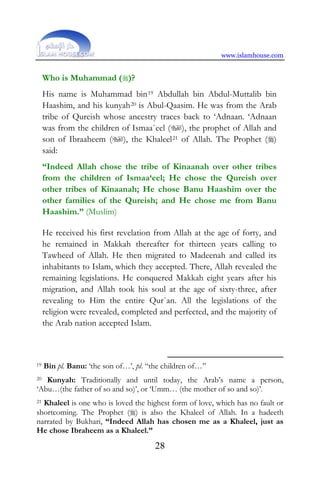
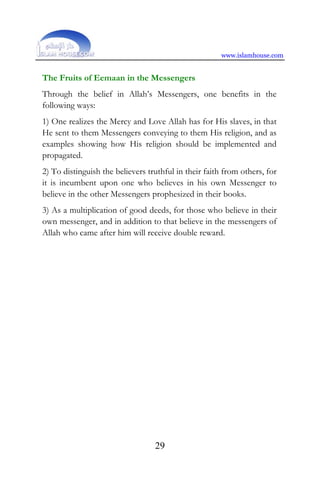
![www.islamhouse.com
30
Eemaan in the Last Day
To have Eemaan in the Last Day is to believe that the life of this
world will one day come to an end. Allah () says:
“Whatsoever is on it (the earth) will perish.” [Surah ar-Rahmaan
(55):26]
When Allah wills this world to come to an end, Allah will order an
angel called Israafeel to blow a horn. At that point, everything in the
heavens and earth will perish, except who Allah wills. Then He will
order him to blow it again, and upon that, all people will rise from
their graves, alive and in their own bodies. Everyone from all parts
of the world, from the time of Adam () until the end of time,
will be resurrected. Allah () says:
“And the Trumpet will be blown, and all who are in the
heavens and all who are on the earth will collapse and die,
except him whom Allah will. Then it will blown a second time
and behold, they will be standing, looking on (waiting).”
[Surah az-Zumar (39):68]
To have Eemaan in the Last Day means to have Eemaan in all of
what Allah () and His Messenger () informed us of what will
occur after death. From these things is the following:
1) To believe in the life of the Barzakh: This life is the time after
one’s death until the Last Day. In it the believer will live a life of
pleasure while the rejecting disbelievers will be punished. Allah ()
says:
“The Fire; they are exposed to it, morning and afternoon, and
on the Day when the Hour will be established (it will be said](https://image.slidesharecdn.com/enhowtobecomemuslim-171104225735/85/En-how-to_become_muslim-30-320.jpg)
![www.islamhouse.com
31
to the angels): ‘Cause Fir‘awn’s (Pharaoh) people to enter the
severest torment!’ ” [Surah al-Ghaafir (40):46]
2) To believe in the Resurrection: This is the Day on which Allah
will resurrect the whole creation, naked, barefoot, and
uncircumcised just as they were born. Allah () says:
“The disbelievers falsely think that they will never be
resurrected (for the Account). Say: ‘Yes! By my Lord, you will
certainly be resurrected, then you will be informed of (and
recompensed for) what you did, and that is easy for Allah.’ ”
[Surah at-Taghaabun (64):7]
3) To believe in the Gathering: Allah will gather all of the
creation together and call them to account. Allah () says:
“And (remember) the Day We shall cause the mountains to
pass away (like clouds of dust), and you will see the earth as a
leveled plain, and We shall gather them all together so as to
leave not one of them behind.” [Surah al-Kahf (18):47]
4) To believe that people will be set before Allah: Allah ()
says:
“And they will be set before your Lord in (lines as) rows, (and
Allah will say): ‘Now indeed, you have come to Us as We
created you the first time.’ ” [Surah al-Kahf (18):48]
5) To believe that one’s limbs will bear witness. Allah () says:
“Till, when they reach it (Hellfire), their hearing (ears) and
their eyes, and their skins will testify against them as to what
they used to do. * And they will say to their skins, ‘Why do
you testify against us?’ They will say: ‘Allah has caused us to
speak, He causes all things to speak: and He created you the](https://image.slidesharecdn.com/enhowtobecomemuslim-171104225735/85/En-how-to_become_muslim-31-320.jpg)
![www.islamhouse.com
32
first time, and to Him you are made to return.’ * And you
have not been hiding yourselves (in the world), lest your ears,
and your eyes, and your skins testify against you; but you
thought that Allah knew not much of what you were doing.”
[Surah al-Fussilat (41):20-22]
6) To believe in the Questioning. Allah () says:
“ ‘But stop them, verily they are to be questioned. * ‘What is
the matter with you? Why do you not help one another [as you
used to do in the world]?’ * Nay, but that Day they shall
surrender.” [Surah as-Saaffaat (37):24-26]
7) To believe in the Siraat, and that everyone must pass over it.22
Allah () says:
“There is not one of you but will pass over it (Hell); this is
with your Lord a Decree which must be accomplished.” [Surah
Maryam (19):71]
8) To believe in the weighing of deeds on the Scale. Allah will
call people to account and pay them their exact dues for their deeds.
He will reward those who did well with what they deserve, due to
their righteous deeds, their Eemaan, and following the messengers,
and He will punish those who did evil, as a payback for what they
committed of evil, disbelief, and disobedience to their messengers.
Allah () says:
“And We shall set up balances of justice on the Day of
Resurrection, then none will be dealt with unjustly in
22 The Siraat is a bridge set over the Hellfire over which all must pass, thinner
than a strand of hair and sharper than a sword. Some will cross it as fast as
lighting, some like a gust of wind, some like the speed of a fast horse, while
others will cross it crawling, each according to his deeds.](https://image.slidesharecdn.com/enhowtobecomemuslim-171104225735/85/En-how-to_become_muslim-32-320.jpg)
![www.islamhouse.com
33
anything. And if there be the weight of a mustard seed, We
will bring it. And Sufficient are We as Reckoners.” [Surah al-
Anbiyaa´ (21):47]
9) To believe in the handing out of scrolls and books. Allah ()
says:
“Then, as for him who will be given his Record in his right
hand, he surely will receive an easy reckoning. * And he will
return to his family in joy! * But whosoever is given his
Record behind his back. * He will invoke (his) destruction. *
And he shall enter a blazing Fire and made to taste its
burning.” [Surah al-Inshiqaaq (84):7-12]
10) To believe that people will be rewarded with either Jannah
or Hellfire in an everlasting and eternal life which will never end.
Allah () says:
“Verily those who disbelieve from among the people of the
Book (Jews and Christians) and the mushrikoon (pagans) will
abide in the Fire of Hell. They are the worst of creatures *
Verily, those who believe and do righteous deeds, they are the
best of creatures. * Their reward with their Lord is the
Paradise of ‘Adn (Eden) (Gardens of Eternity), underneath
which rivers flow. They will abide therein forever, Allah will be
pleased with them, and they with Him. That is for him who
fears his Lord.” [Surah al- Bayyinah (98):6-8]
11) To believe in the Hawd23, Intercession24, and all other things
which the Messenger of Allah () informed us.
23 Hawd: Literally: pool. The pool from which the true followers of
Muhammad () will drink, after which they will never feel thirst again.](https://image.slidesharecdn.com/enhowtobecomemuslim-171104225735/85/En-how-to_become_muslim-33-320.jpg)
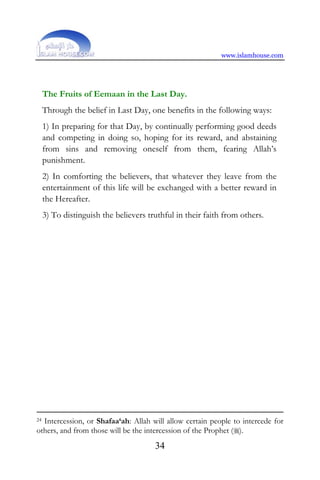
![www.islamhouse.com
35
Eemaan in Qadaa´ and Qadar25
To have Eemaan in Qadaa´ and Qadar is to believe that Allah
always26 knew everything before its came into being, and what will
happen to them afterwards. He then brought them into existence,
all in accordance to His Knowledge and Measure. Allah () says:
“Verily, We have created all things with Qadar.” [Surah al-
Qamr (54):49]
Everything which occurred in the past, is occurring in the present,
and will occur in the future in this universe was known to Allah
before it came to be. Then Allah brought it into being, all in
accordance to His Will and Measure. The Messenger of Allah ()
said:
“A person is not a Muslim until he believes in Qadar, its good
and its evil effects – until he knows that whatever happened to
him would have never missed him, and what did not happen
to him would never have occurred.” (Tirmidhi)
The belief in Qadar means to believe in four things:
1) To believe that Allah always knew everything the creation would
do, and there was never a time in which He did not know.
2) To believe that Allah wrote all of this in the ‘Preserved Tablet’
(Al-Lawh-ul-Mahfoodh). The Prophet () said:
25 Qadaa´ and Qadar: These two Arabic words are usually translated as ‘fate’,
‘destiny’, or ‘pre-ordainment’. Many of these English words lead to incorrect
belief this concept, so the original Arabic terms have been retained in order
that one understand them in their true sense.
26 There was never a time when He did not know, rather, He always knew it.](https://image.slidesharecdn.com/enhowtobecomemuslim-171104225735/85/En-how-to_become_muslim-35-320.jpg)
![www.islamhouse.com
36
“The first thing which Allah created was the Pen, and He said
to it, ‘Write.’ It responded, ‘What should I write?’ He said,
‘Write everything that will occur until the Day of
Ressurection.’ ” (Abu Dawood)
3) The belief in the Will of Allah which always comes to be, and his
Absolute Ability and Power over all things. This is to believe that
whatever Allah wills comes to be, and whatever He does not will
does not come to be.
4) The belief that there is no creation in the earth or in the heavens
except that Allah () created it. There is no Creator, Lord or
Sovereign other than Him.27
This belief is not in opposition to the fact that one must do
everything in his means to achieve things. For example, if someone
wants children, he must fulfill those means which allow him to
achieve this goal, such as marriage. But after fulfilling these means,
he may be granted the results he hoped for –which are children - or
he may not, all according to the Will of Allah (). The reason for
this is that the means are not the true causes of things, but rather
the true cause is the Will of Allah (). These means that we strive
to fulfill are also from the Qadar of Allah (), and for this reason,
the Prophet () explained to the Sahaabah28 when they asked him:
“ ‘O Messenger of Allah, do the verses and supplications we
recite, the medicine we take to cure ourselves, and the various
shields we use to ward harm change the Qadar of Allah ()?’
[He replied,] ‘They are from the Qadar of Allah.’ ” (Ta’leeqaat
ar-Radiyyah)
27 ‘Rawdat-un-Nadiyyah’ Sharh ‘Aqeedat-il-Waasitiyyah’, p.352-353.
28 Sahaabah: The Companions of the Prophet (). Any one who met the
Prophet () as a Muslim and died as a Muslim.](https://image.slidesharecdn.com/enhowtobecomemuslim-171104225735/85/En-how-to_become_muslim-36-320.jpg)
![www.islamhouse.com
37
The Fruits of Eemaan in Qadaa´ and Qadar
Through the belief in Qadaa´ and Qadar, one benefits in the
following ways:
1) It strengthens his dependence upon Allah [in achieving results]
after fulfilling its means.
2) One becomes pleased with whatever results, which in turn
produces peace of heart and spiritual satisfaction. There is no room
left for stress, worry, or sadness felt due to the outcomes of affairs.
Allah () says:
“No calamity befalls on the earth or in yourselves but is
inscribed in the Book of Decrees (Al-Lawh Al-Mahfoodh),
before We bring it into existence. Verily, that is easy for Allah.
* In order that you may not be sad over matters that you fail
to get, nor rejoice because of that which has been given to
you. And Allah likes not prideful boasters.” [Surah al-Hadeed
(54):22-23]
3) It eases the effects of calamities faced by humans. The Prophet
() said:
“The strong believer is better and more beloved to Allah than
a weak believer, and in each one there is good. Be keen to do
what benefits you and seek help in Allah, and do not be
neglectful in doing so. And if any mishap befalls you, do not
say, ‘If only I had only done such and such,’ but rather say,
‘This is the Qadar of Allah, and whatever He Wills He does
(Qaddarullaah wa maa shaa fa‘al),’ for indeed [the saying of]
‘if’ opens the door for Shaytaan’s works.” (Muslim)](https://image.slidesharecdn.com/enhowtobecomemuslim-171104225735/85/En-how-to_become_muslim-37-320.jpg)
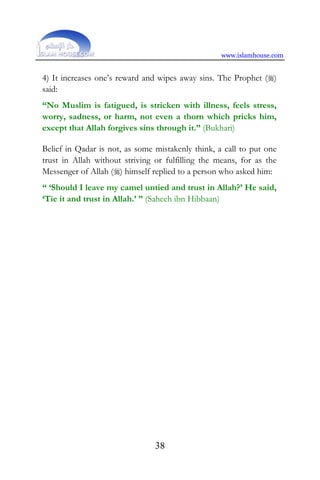
![www.islamhouse.com
39
The Testimony that ‘Muhammad is the
Messenger of Allah’
To bear witness that Muhammad is the Messenger of Allah
necessitates the following:
1) To believe that he is a Messenger, and to believe that he is the
best, the last, and the seal of the Messengers; no messenger will
come after him. Allah () says:
“Muhammad is not the father of any man among you, but he
is the Messenger of Allah and the last (end, seal) of the
Prophets.” [Surah al-Ahzaab (33):40]
2) To believe that he is infallible in the teachings he conveyed from
Allah (), due to His saying:
“Nor does he speak of (his own) desire. * It is only an
Inspiration that is inspired.” [Surah an-Najm (53):3-4]
As for the affairs of this world, he was a human, and he used his
own personal judgments (i.e. it was not revealed to him by Allah).
The Prophet () said:
“Indeed I am only a human. It may be that a claimant comes
to me with a dispute, and due to one of them being more
coercive in speech than the other, I may rule in his favor.
Whoever was ruled in his favor while he is wrong, [what he is
receiving without right] is only a portion of the Hellfire, so let
him take it or leave it.” (Muslim)
3) To believe that he is a messenger to all of creation, both the Jinn
and Humans, until the Last Hour. Allah () says:](https://image.slidesharecdn.com/enhowtobecomemuslim-171104225735/85/En-how-to_become_muslim-39-320.jpg)
![www.islamhouse.com
40
“And We have not sent you (O Muhammad ) except to all of
humanity, as a giver of glad tidings and a warner, but most
people know not.” [Surah Saba´ (34):28]
4) To obey the Prophet () in what he ordered, to believe in
everything he said, and to abstain from what he has forbidden and
warned against. Allah () says:
“And whatsoever the Messenger gives you, take it, and
whatsoever he forbids you, abstain (from it)” [Surah al-Hashr
(59):7]
5) To follow and cling to the Prophet’s () Sunnah without adding
to it. Allah () says:
“Say (O Muhammad to mankind): If you (really) love Allah
then follow me, Allah will love you and forgive you of your
sins. And Allah is Oft-Forgiving, Most Merciful.” [Surah Aali
‘Imraan (3):31]](https://image.slidesharecdn.com/enhowtobecomemuslim-171104225735/85/En-how-to_become_muslim-40-320.jpg)

![www.islamhouse.com
42
After pronouncing the Shahaadataan, it is from the Sunnah that a
person do the following things:
1) It is recommended that one perform a complete bath (ghusl)
with pure water and then perform a prayer consisting of two
rak‘ahs29. In a hadeeth, a person named Thumaamah al-Hanafi was
taken captive while he was a disbeliever. The Prophet () would
repetitively approach him saying:
“What do you say, O Thumaamah?” He would say, “If you
decide to kill me, you would be killing [in right] because I
have killed; if you let me free, you would be letting free one
who shows gratitude; and if you desire wealth, we will give
you what you please.” The Companions of the Prophet ()
liked to ransom captives, and so they said, “What would we
gain if we killed him?” So finally one day, the Prophet ()
decided to set [Thumaamah] free, and [upon that] he
accepted Islam. The Prophet () untied him and sent him to
the walled garden of Abu Talhah, commanding him to take a
complete bath (ghusl). He performed a complete bath and
prayed to rak‘ahs, and the Prophet () said, “Your brother’s
Islam is sincere.” (Saheeh ibn Khuzaimah)
29 Rak‘ah: a cycle consisting of one standing, bowing, and two prostrations. It
will be explained further in detail later.](https://image.slidesharecdn.com/enhowtobecomemuslim-171104225735/85/En-how-to_become_muslim-42-320.jpg)
![www.islamhouse.com
43
A Description of a Complete Bath (Ghusl)
The Intention (Niyyah). One must intend in his heart that he is
performing ghusl to remove himself from a major state of
impurity30 – whether janaabah31, menstruation or postpartum
bleeding – without uttering such intention vocally.
Mentioning the Name of Allâh. One should say, ‘Bismillah’
(trans. ‘In the Name of Allâh’).
He should wash his hands, and then his private parts removing
the filth.
Next, he should perform a complete ablution (wudoo´)32 as
he would for the Prayer. He may delay washing his feet until the
end of his ghusl.
He should pour [at least] three handfuls of water on his
head, running his fingers through his hair and beard so that water
reaches the roots of his hair and scalp.
Then he should pour water over the rest of his body, rubbing
it, beginning with the right side and then the left. He should take
care that water reaches his armpits, ears, navel, and in between the
folds of the skin if he were fat, for these folds of flesh which form
30 A state of impurity is a state one enters after having done specific acts.
There are two types, major and minor, and both will be explained later.
31 A state of Janaabah is a spiritual state of impurity which one enters after
having sexual intercourse, or after ejaculation of men or the release of
orgasmic fluid for women.
32 The ablution, or wudoo´ in Arabic, is washing specific parts of the body to
remove oneself from a state of minor impurity. It will be explained in detail
later.](https://image.slidesharecdn.com/enhowtobecomemuslim-171104225735/85/En-how-to_become_muslim-43-320.jpg)
![www.islamhouse.com
44
in the obese prevent water from reaching the areas of skin
concealed within the folds, and thus may remain dry. He should
then wash his feet if he had not already done so while making
wudoo´ [before performing the ghusl]. ‘Aa`ishah () reported:
“When Allâh’s Messenger () would perform ghusl due to
sexual intercourse, he would first wash his hands, then pour
water with his right hand into his left, washing his private
parts. After that he would perform wudoo´ as he would for the
Prayer, and then take water and rub it in to the roots of his
hair with his fingers. [Lastly] he would wash his feet.”
(Muslim)
Ghusl becomes obligatory after one of the following things:
1) Ejaculation, whether the semen of men or the fluid released by
women upon having an orgasm, due to desire, nocturnal emission,
or the like.
2) Sexual intercourse, even if it does not result in ejaculation.
3) Following the cease of one’s menses, and
4) Following postpartum bleeding.](https://image.slidesharecdn.com/enhowtobecomemuslim-171104225735/85/En-how-to_become_muslim-44-320.jpg)
![www.islamhouse.com
45
The Wudoo´
One should know that one must perform wudoo´ before the
Prayer, due to the saying of the Prophet ():
“No Prayer is accepted without purification, and no charity is
accepted from earnings made from impermissible sources.”
(Muslim)
Allah () says:
“O you who believe! When you intend to offer the Salaah,
wash your faces and your hands up to the elbows, pass wet
hands over your heads, and [wash] your feet up to the ankles.”
[Surah al-Maa`idah (5):6]
One should perform wudoo´ in the following manner:
Homraan the freed slave of ‘Uthmaan bin ‘Affaan () said:
“I saw ‘Uthmaan () perform wudoo´. He poured water on
his two hands thrice, then he rinsed his mouth and nose,
washed his face thrice, washed his right hand up to his elbow
thrice, washed his right hand up to his elbow thrice, wiped
over his head once, washed his right foot thrice, and then his
left foot thrice. He then said, ‘I saw the Messenger of Allah
() perform wudoo´ like this wudoo´, and then say: ‘Whoever
performs wudoo´ like my wudoo´ I have just performed, and
then prays two rak’ahs not thinking about anything else, Allah
will forgive him all his previous sins.’ ” (Bukhari)
1) One should intend with his heart that he is performing wudoo´
to purify himself from a minor state of impurity. The evidence that](https://image.slidesharecdn.com/enhowtobecomemuslim-171104225735/85/En-how-to_become_muslim-45-320.jpg)
![www.islamhouse.com
46
the intention (niyyah) is obligatory is the statement of the Prophet
():
“All deeds depend on their intention, and each person will be
rewarded according to what they intend…” (al-Bukhâri)
2) One should say, “Bismillaah (In the Name of Allah),” before
commencing the wudoo´. The Prophet () said:
“There is no Prayer for one who does not perform wudoo´,
and there is no wudoo´ for one who does not mention the
Name of Allâh.” (Abu Dawood)
3) One should wash his hands thrice in the beginning of the
wudoo´, due to the hadeeth of Aws bin Aws ath-Thaqafi () in
which he said:
“I saw Allâh’s Messenger () wash his hands three times
when he performed wudoo´.” (Ahmad)
4) One should rinse his mouth and rinse his nose by inhaling water
into it thrice. He should exhale the water from the nose with the
help of the left hand.
5) One should wash his face thrice. The face consists of the area
starting from the forelock at the top of the forehead of a normal
haired man to the bottom of the [chin or] beard, vertically, and
from right earlobe to the left, horizontally.
6) One should wash his hands from the tips of fingers up to and
including the elbow, beginning first with the right hand, then the
left. If he happens to be wearing a ring or a watch, they must move
it in order to allow the water to reach the skin underneath it.
7) One must wipe over his head once. This is done by wetting the
hands and passing them over the head, beginning from front,](https://image.slidesharecdn.com/enhowtobecomemuslim-171104225735/85/En-how-to_become_muslim-46-320.jpg)
![www.islamhouse.com
47
proceeding to the back, then passing them back over the head to
the front. Abdullah ibn Zaid () narrated:
“Allâh’s Messenger () passed his two hands over his head
starting from the front, proceeding to the back. He started
from his forehead and passed them over to the top of his neck,
and then passed them back to the place where he started
from.” (Saheeh ibn Khuzaimah)
8) One should wipe over his ears by inserting his wet index fingers
[which he used to wipe his head] into the cavity if the ears, while
wiping the outside with his wet thumbs. In ibn ‘Abbaas’s
description of the wudoo of the Prophet (), he said:
“He wiped his head and ears once.” (Abu Daawud)
In another narration, he said:
“He then wiped over his head and out his two index fingers
into his ears, He wiped the outside of his ears with his
thumbs, and the insides of his ear with his index fingers.”
(Abu Daawud)
9) One should wash his feet three times from the tips of the toes up
to and including the ankles. Abu Hurairah () said that he saw a
person who did not wash his heels, and he said to him:
“Woe to the heels from the Hellfire!” (Muslim)
10) One should wash the parts of wudoo´ in the correct sequence.
He should wash one part after another in the order that Allah
commanded. He should not wash one body part before another
which it should come after, for in the verse quoted previously, Allâh
mentioned the obligatory acts of wudoo´ in a specific sequence.](https://image.slidesharecdn.com/enhowtobecomemuslim-171104225735/85/En-how-to_become_muslim-47-320.jpg)
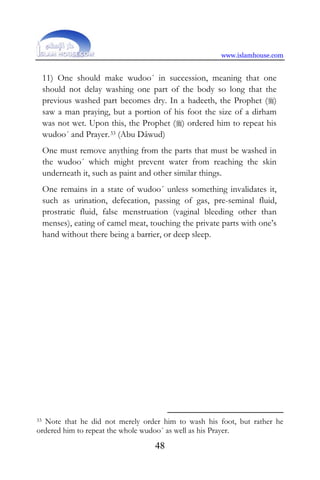
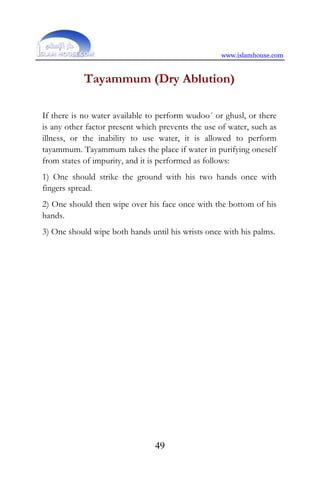
![www.islamhouse.com
50
The Salaah (Prayer)
It is obligatory upon you to establish the Salaah, for it is the
backbone of the religion; without it, one’s Islam cannot stand
upright. The Prophet () said [striking an example between the
religion and a camel]:
“As for the head of the religion, it is Islam (the Shahadataan);
as for its backbone, it is the Salaah, and as for the highest part
of its hump, it is Jihad34.” (Haakim)
The Salaah is a term which denotes a group of words and actions
which start with the takbeer (saying ‘Allahu Akbar’, meaning ‘Allah
is the greatest’) and end with the tasleem (saying ‘As-Salaamu
‘alaykum wa Rahmatullaah).
The Fruits of Salaah
When one establishes the Salaah, he benefits in the following ways:
1) Spiritual joy: The Salaah establishes a relationship between the
slave and Allah. He converses with Him, supplicating to Him in
sincere humbleness.
2) Peace at heart and tranquility. The Prophet () said:
“I have been made to love women, perfume, and the Salaah
has been made the delight of my eyes.” (Haakim)
34 Jihad: Fighting against the disbelievers to raise Allah’s word and establish
the laws of Islam.](https://image.slidesharecdn.com/enhowtobecomemuslim-171104225735/85/En-how-to_become_muslim-50-320.jpg)
![www.islamhouse.com
51
3) The Salaah prevents from all sinful and licentious deeds. Allah
() says:
“Verily, the Salaah prevents from licentiousness, and every
kind of evil wicked deed, and the praising of (you by) Allah (in
front of the angels) is greater indeed [than your praising Allah
in prayers].” [Surah al-‘Ankaboot (29):45]
4) The Salaah strengthens the bonds of love and unity between the
Muslims. It breaks down all social differences that may exist
between them; they all stand together side by side in rows, the old
and young, the rich and poor, and the noble and ignoble. All people
are the same, humbling themselves before Allah, facing the same
direction (the Qiblah35), performing the same actions, reciting the
same recitation, all at the same time.
35 Qiblah: the direction of the Ka’bah.](https://image.slidesharecdn.com/enhowtobecomemuslim-171104225735/85/En-how-to_become_muslim-51-320.jpg)
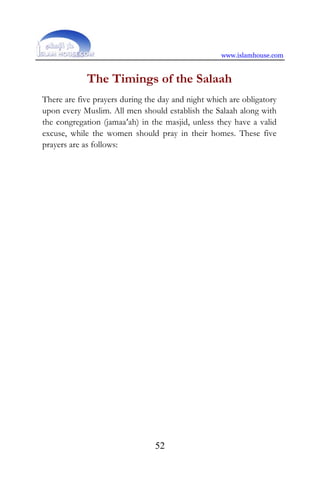
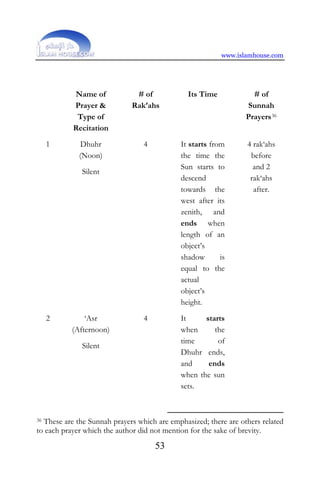
![www.islamhouse.com
54
3 Maghrib
(Dusk)
Audible
3 It starts
when the Sun
has totally
set, and ends
when red
color of dusk
disappears.
2 rak‘ahs
after
4 ‘Ishaa´
(Night)
Audible
4 It starts
when the
time of
Maghrib
ends, and
ends at the
first
appearance of
light before
dawn.
2 rak‘ahs
after
5 Fajr (Dawn)
Audible
2 It starts at
the first
appearance of
light at dawn,
and ends
when the sun
starts to rise.
2 rak‘ahs
before
The Messenger of Allah () himself established the times for the
Prayer. He () said:
“The time of Dhuhr is when the sun declines from its zenith
until a person’s shadow becomes equal to his height, and that
is the time of ‘Asr. The [recommended] time of ‘Asr continues](https://image.slidesharecdn.com/enhowtobecomemuslim-171104225735/85/En-how-to_become_muslim-54-320.jpg)
![www.islamhouse.com
55
until the sun starts to turn yellow [at which point it becomes
makrooh37]. The time of Maghrib remains until the red color
of the horizon disappears, and the time of ‘Ishaa´ remains
until the first appearance light before dawn until the sun starts
to rise. If the sun starts to rise, then abstain from Prayer, for
indeed it rises between the two horns of the Shaytaan.”
(Muslim)
37 Makrooh: Something disliked in the religion. If a person does it, he will not
be punished, but if he leaves it, he will be rewarded. It is preferred to pray ‘Asr
before the sun starts to appear yellow, but it is still permissible until the sun
reddens before the time of sunset. Other hadeeth show that the time of ‘Asr
lasts until just before the sun sets. On another occasion, the Prophet ()
showed the companions the last time they could pray each prayer. For the time
of ‘Asr, the Prophet (): “…delayed the ‘Asr Prayer until the time that
upon finishing it, a person would say that the Sun had reddened (which
occurs just before sunset.)” (Muslim)](https://image.slidesharecdn.com/enhowtobecomemuslim-171104225735/85/En-how-to_become_muslim-55-320.jpg)
![www.islamhouse.com
56
The Prerequisites of Salaah
Know that the Salaah has certain prerequisites; if one leaves them,
the Prayer is invalid. They are as follows:
1) Praying them in their proper times.
2) One must have performed purification from the minor and
major states of impurity. Allah () says:
“O you who believe! When you intend to offer the Salaah,
wash your faces and your hands up to the elbows, pass wet
hands over your heads, and [wash] your feet up to the ankles.
If you are in a state of janaabah (state of major impurity),
purify yourself (bathe your whole body).” [Surah al-Maa`idah
(5):6]
3) One’s body must be clean from any impurities. The Prophet ()
said:
“Be careful to keep yourself clean from urine, for indeed the
majority of the punishment of the graves is due to people not
doing so.” [Daraqutni]
One must also keep his clothes pure from any impurities. Allah ()
says:
“And purify your garments.” [Surah al-Muddathir (74):4]
One must as well make sure that the place he is praying is also free
from impurities. In a hadeeth, a bedouin once urinated in the
masjid, so the people stood up to confront and stop him. Upon that
the Prophet () said:](https://image.slidesharecdn.com/enhowtobecomemuslim-171104225735/85/En-how-to_become_muslim-56-320.jpg)
![www.islamhouse.com
57
“Leave him (to finish i.e. now that he has started) and pour a
bucket of water where he urinated, for you have been sent to
make things easy, not to make things hard.” (Bukhari)
4) Covering one’s ‘awrah38. For a man, it is the area between the
naval and the knees, but in Salaah, it includes the two shoulders. As
for a woman, it is her whole body, but in Salaah, she does not need
to cover her face and hands. Allah () says:
“O Children of Adam! Take your adornment (by wearing
clean clothes), while praying.” [Surah al-A’raaf (7):31]
5) One must face the Qiblah. Allah () says:
“So turn your face in the direction of al-Masjid al-Haraam (at
Makkah). And wheresoever you are, turn your faces (in prayer)
in that direction.” [Surah al-Baqarah (2):144]
A woman experiencing menstruation and postpartum bleeding must
not pray until her bleeding ceases. She should then perform a
complete bath (ghusl) and then start to pray again, performing
ablution (wudoo´) for each Prayer if she invalidates it. She should
not make up any prayer she missed while bleeding.
38 ‘Awrah: The parts of the body which is forbidden for other to look at.](https://image.slidesharecdn.com/enhowtobecomemuslim-171104225735/85/En-how-to_become_muslim-57-320.jpg)
![www.islamhouse.com
58
A Description of the Salaah
1) One should first perform a complete and perfect wudoo´, as
Allah () ordered:
“O you who believe! When you stand to offer as-Salaah (the
prayer), wash your faces and your hands up to the elbows,
pass wet hands over your heads, and [wash] your feet up to
ankles.” [Surah al-Maa`idah (5):6]
2) One should face the Qiblah, which is the Ka’bah, with his whole
body and intend with his heart the specific Prayer he is about to
perform, without uttering his intention vocally.
3) One should pronounce the Takbeerat-ul-Ihraam by saying
‘Allahu Akbar (Allah is the Greatest)’. He should do so looking at
the place where he will prostrate, raising his hands level to his
shoulders or his ears, extending his fingers [with his palms] facing
the Qiblah.
4) One should put his hands on his chest, placing his right hand
over his left, and recite the opening supplication (Du‘aa-ul-
Istiftaah):
“Subhaanak-Allahumma wa bi hamdika, wa tabaarak-
Asmuka, wa ta‘aala jaddukka wa laa ilaaha ghayruka.”
“I declare You free and far removed from all imperfections, O
Allah, and all praise is for You. Blessed is Your Name. Great
and Exalted is Your Kingdom. None has the right to be
worshipped besides You.”
One should then say:](https://image.slidesharecdn.com/enhowtobecomemuslim-171104225735/85/En-how-to_become_muslim-58-320.jpg)
![www.islamhouse.com
59
“A‘oodhu billaahi min ash-Shaytaan ir-Rajeem. Bismillaah ir-
Rahmaan ir-Raheem.”
“I seek refuge with Allaah from Satan, the Rejected One. In
the Name of Allah, the Most Merciful, the Bestower of
Mercy.”
Then one should recite Surah al-Faatihah39, saying ‘Aameen’ after
finishing it aloud in those prayers recited out loud, and silently in
those prayers recited silently. After this one should recite whatever
is easy for him from the Qur`an.
5) After completing recitation, one should bow (Rukoo’), by
bending ones back forward. First he should say:
“Allahu Akbar.”
“Allah is the Greatest.”
…and raise his hands to his shoulders or ears while doing so. Then
he should go into the rukoo’, extending his back, making his
heading level with it. At this point he should place his hands with
fingers spread on his knees, keeping the elbows away from his sides
and not tucked inside. In the rukoo’, one should say three times,
“Subhaana Rubbiy-il-Adheem.”
“I declare my Lord, the Most Magnificent, be exalted and
High Above from all deficiencies.”
6) One should raise his head [and upper body] from the rukoo’,
raising his hands to his shoulders or ears, saying:
“Sami‘allahu liman Hamidah.”
39 See appendix I.](https://image.slidesharecdn.com/enhowtobecomemuslim-171104225735/85/En-how-to_become_muslim-59-320.jpg)
![www.islamhouse.com
60
“Allah hears those who praise and extol Him.”
One should say this whether he is praying alone or leading others in
Prayer. After fully returning to a standing position, one should say:
“Rabanaa wa lak-al-Hamd.”
“Our Lord, and to You is all praise.”
But if one is praying behind an Imaam40, he should say while
standing:
“Rabanaa wa lak-al-Hamd.”
“Our Lord, and to You be all praise.”
It is recommended that one should place his hands on his chest as
he did in the first standing before the rukoo’.
7) Next one should descend and prostrate (Sujood). He should say:
“Allahu Akbar.”
“Allah is the Greatest.”
…without raising his hands [to his shoulders or ears]. He should
then descend, placing his knees on the ground before his hands if it
is not hard for him, and prostrate upon his forehead and nose, his
two hands, his two knees, the bottom of the toes of his two feet.
The fingers of his two hands and his toes should be facing the
Qiblah, and his fingers should be joined together (not spread apart).
He should keep his elbows away from his sides and not tuck them
inside [but rather he should spread them]. He should keep his knees
away from his stomach, keep his thighs away from his legs, and lift
40
Imaam: Literally: leader. Here, it means one who leads others in Prayer.](https://image.slidesharecdn.com/enhowtobecomemuslim-171104225735/85/En-how-to_become_muslim-60-320.jpg)
![www.islamhouse.com
61
his elbows and forearms up off the ground. He should then say
three times:
“Subhaana Rubbiy-il-A’laa.”
“I declare my Lord, the Most High, be exalted and High
Above from all deficiencies.”
One should supplicate as much as possible41 in the sujood, for the
Prophet () said:
“As for the rukoo’, magnify the Lord (), and as for the
sujood, make as much supplication as you can, for [it is the
place where] it is most likely to be accepted.” (Muslim)
8) One should raise his head from the sujood and say, “Allahu
Akbar.” One should not raise his hands to his shoulders or ears
while saying so. He should lay his left foot flat on the ground
[pointing to the right] and sit upon it, and prop his right foot
upright [with the bottom of his toes on the ground facing the
Qiblah]. One should place his hands on his thighs and knees, and
then say thrice:
“Rubbighfir li.”
“My Lord, forgive me.”
In addition to this, he may say:
“Allahumm-aghfir li, warhamni, wahdini, warzuqni, wa
‘aafini, wajburni.”
41 This may be said in his own words, and need not be reported of the Prophet
(). If he does not know Arabic, he may ask Allah in his native language.](https://image.slidesharecdn.com/enhowtobecomemuslim-171104225735/85/En-how-to_become_muslim-61-320.jpg)
![www.islamhouse.com
62
“O Allah, forgive me, have mercy upon me, grant me
sustenance, keep me in a state of safety and wellbeing, and
strengthen my weakness.”
9) Then one should perform a second sujood saying, “Allahu
Akbar,” without raising his hands. He should do as he did in the
first sujood.
10) One should raise his head [from sujood] saying, “Allahu
Akbar,” without raising his hands [to his shoulders or ears], and
stand up and perform the second rak‘ah, taking support on his
knees if he is able. If it is hard for him, he should take support on
the ground with his two hands. While standing, he should recite
Surah al-Faatihah along with whatever is easy from the Qur`an after
it, just as he did in the first rak‘ah.
11) If one is performing a prayer which consists of two rak‘ahs,
such as Fajr, Jumu‘ah, or ‘Eid, after the second prostration he
should sit with his right foot propped up, sitting on his left foot laid
flat [pointing to the right]. He should clench his right hand and
place it on the lower part of his right thigh, and he should point
with his finger during his supplication and mentioning Allah (the
tashahhud), symbolizing His Tawheed. He should place his left
hand on the bottom part of his left thigh and knee and recite the
tashahhud:
“At-tahiyyaatu lillaahi, was-salawaatu, wat-tayyibaatu, as-
Salaamu ‘alayka ‘ayyuhan-Nabiyyu, wa Rahmatullaahi wa
Barakaatuh. As-Salaamu ‘alaynaa wa ‘alaa ‘ibaad-illaah-is-
saaliheen. Ash-hadu an laa ilaaha ill-Allaah, wa ashhadu anna
Muhammadan ‘abduhu wa rasooluh. Allahumma salli ‘alaa
Muhammad wa ‘alaa Aali Muhammad kamaa sallayta ‘alaa
Ibraaheem, wa Aali Ibraheem innaka Hameedum-Majeed. Wa
baarik ‘alaa Muhammad wa ‘alaa Aali Muhammad kamaa](https://image.slidesharecdn.com/enhowtobecomemuslim-171104225735/85/En-how-to_become_muslim-62-320.jpg)
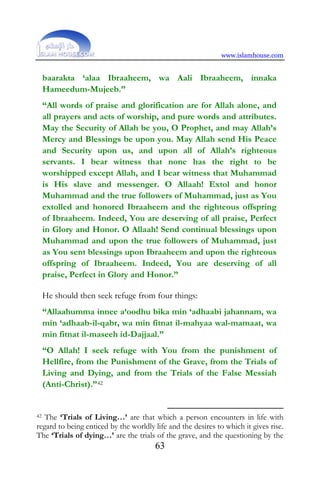
![www.islamhouse.com
64
Then one should ask Allah with whatever supplication he wishes,43
asking whatever he desires from the good things of this life and
next.
12) Lastly, one should make the ‘tasleem’ to the right, by turning his
head to the right saying:
“As-Salaamu ‘alaykum wa Rahmatullaah.”
“May the Safety and Mercy of Allah be upon you.”
Then he should make tasleem to his left, by turning his head to the
left, saying, “As-Salaamu ‘alaykum wa Rahmatullaah.”
13) If one is performing a three rak‘ah Prayer, such as Maghrib, or a
four rak‘ah prayer, such as dhuhr, ‘Asr or ‘Ishaa, after saying “Ash-
hadu an laa ilaaha ill-Allah wa ash-hadu anna Muhammadan
‘Abduhu wa Rasooluhu,” in the tashahhud mentioned previously,
he should stand up and pray the third rak‘ah for a three rak‘ah
prayer, or the third and fourth rak‘ahs for a four rak‘ah prayer. He
should stand, seeking support on his knees if he is able, and raise
his hand level with his shoulders [or ears] saying, “Allahu Akbar.”
He should place his hands on his chest, grasping the right hand
over the left, and recite Surah al-Faatihah. He should do the same as
he did in the previous rak‘ahs. He should then sit for the last
tashahhud, and after its recitation, he should finish his Prayer by
making the tasleem.
two Angels. The ‘Trials of the False Messiah…’ are the supernatural
occurrences that will happen at the Anti-Christ’s hands, called the Dajjaal in
Arabic: things that will lead many people to go astray, to follow him and accept
his claim to divinity.
43 This may be said in his own words, and need not be reported of the Prophet
(). If he does not know Arabic, he may ask Allah in his native language.](https://image.slidesharecdn.com/enhowtobecomemuslim-171104225735/85/En-how-to_become_muslim-64-320.jpg)
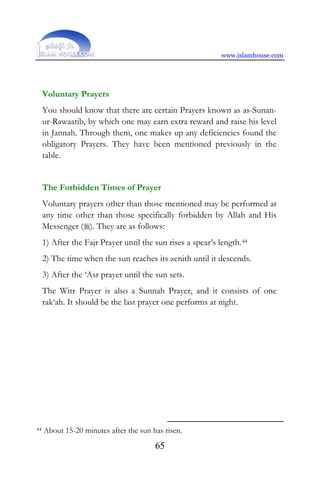
![www.islamhouse.com
66
Zakaah
Upon becoming Muslim, one must pay the Zakaah to those who
deserve it. The Zakaah is a right from the rights of Allah () which
a Muslim must pay to his brothers from the poor and needy to
cover their requirements and save them from the humility of asking
others. Allah () says:
“And they were commanded not, but that they should worship
Allah, and worship none but Him Alone (abstaining from
ascribing partners to Him), and establish the Salaah and give
the Zakaah: and that is the upright religion.” [Surah al-Bayyinah
(98):5]
There is a great wisdom and many reasons why Zakaah has been
prescribed. From them may be the following:
1) It purifies the souls of the rich Muslims and cleanses them from
greed, selfishness, base covetousness, and the love of this temporal
world and drowning in its desires.
2) It purifies the soul of the poor from hate and jealousy which they
might feel for the rich. They see them giving from their wealth that
which Allah ordered, continuously caring for them, by giving them
money and treating them well.
3) It causes a Muslim to grow fond of good manners, such as giving
charity, expending efforts, and preferring others to one’s self.
4) It uproots poverty in the Muslim society and alleviates the
dangers which result from it, like theft, murder, and acts of
transgression against people’s honor. It brings the spirit of the](https://image.slidesharecdn.com/enhowtobecomemuslim-171104225735/85/En-how-to_become_muslim-66-320.jpg)
![www.islamhouse.com
67
mutual dependence and the brotherhood of the Muslim society to
life, by fulfilling the needs of Islam and the Muslims.
5) It plays a role in spreading the call to Islam in the world.
Through it, the non-Muslims are shown the religion of Islam and its
beauty, and it is hoped that they accept it.
The Conditions of Zakaah
1) Possession in the nisaab, which is that amount of wealth that
upon which Islam has legislated Zakaah. This amount is equal to 85
grams of gold.
2) The elapse of one year, if one possesses the nisaab for a period
of a complete year.
Those Eligible for Zakaah
Allah has specified those people who are eligible to receive Zakaah.
Allah () says:
“As-Sadaqaat (here Zakaat) are only for the fuqaraa´ and
masaakeen (the poor) and those employed to collect [the
funds]; and for to attract the hearts of those who have been
inclined [towards Islam]; and to free the captives; and for
those in debt; and for Allah's Cause (i.e. for Mujaahidoon -
those fighting in Jihad), and for the wayfarer (a traveler who is
cut off from everything); a duty imposed by Allah. And Allah
is All-Knower, All-Wise.” [Surah at-Tawbah (9):60]](https://image.slidesharecdn.com/enhowtobecomemuslim-171104225735/85/En-how-to_become_muslim-67-320.jpg)
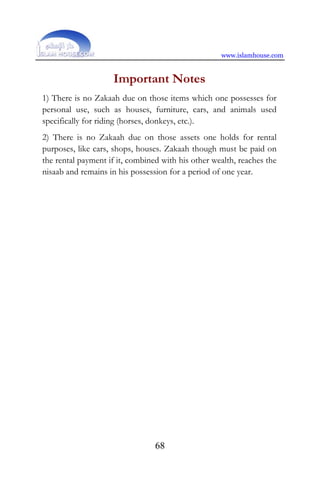
![www.islamhouse.com
69
The Fast (Siyaam) of Ramadaan
Upon becoming Muslim, one must fast the month Ramadaan, every
year. One must abstain from anything that breaks the fast, such as
food, drink, and sexual intercourse, from the time of Fajr until
Maghrib as an act of obedience to Allah. Allah () says:
“O you who believe! Fasting has been prescribed for you as it
was prescribed for those before you, that you may become
from the pious.” [Surah al-Baqarah (2):183]
The objective of fasting is not that one merely abstain from the
material and physical things which break one’s fast, but rather, one
must also refrain from those intangible things which wipe [the
reward] of one’s fast, such as lying, backbiting, tale-bearing,
cheating, deception, false talk, and other offensive behavior. He
should keep in mind that it is obligatory upon him to abstain from
these offensive acts outside of Ramadaan, but more so in this
month, due to the saying of the Prophet ():
“Whoever does not refrain from false speech and deeds, Allah
had no need for him to leave his food and drink.” (Bukhari)
There are many reasons and great wisdoms why the Siyaam has
been prescribed. From them may be the following:
1) It is spiritual exercise for the believer, for his soul is making
jihad45 against his wants and desires.
45 Jihad: Here the word is used in its literal sense, which means ‘to strive
against’.](https://image.slidesharecdn.com/enhowtobecomemuslim-171104225735/85/En-how-to_become_muslim-69-320.jpg)
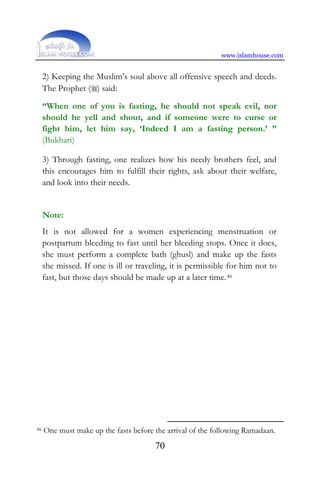
![www.islamhouse.com
71
Hajj
Upon becoming Muslim, one must perform Hajj once in his
lifetime. Hajj is the pilgrimage one makes to the Sacred House of
Allah (the Ka’bah) in order to perform certain rites at specific places
at specific times. This pillar of Islam is obligatory upon every
Muslim, male or female, who is sane and has reached the age of
puberty once in their lifetime, if they have the physical and
monetary ability. If a person has an incurable disease which
prevents him from performing Hajj, but he does have enough
money, he must assign someone to perform Hajj for him. But if a
person does not have more money than what he needs to fulfill his
daily requirements or those whom he supports, Hajj is not an
obligation upon him. Allah () says:
“And the performing of Hajj to the House (Ka’bah) is a duty
that mankind owes to Allah, those who can afford the
expenses; and whoever disbelieves, then Allah stands not in
need of any of the ‘aalameen (mankind and Jinns).” [Surah Aali
‘Imraan (3):97]
There are many reasons and great wisdoms why Hajj has been
prescribed. From them may be the following:
1) To increase ones good reward due to his act of obedience, for
the reward for a Hajj which has been accepted by Allah is nothing
but Jannah. The Messenger of Allah () said:
“An ‘Umrah47 followed by another is an expiation for the
lesser sins one performed between them, and there is no
47 ‘Umrah: Lesser pilgrimage. It consists of Tawaaf and Sa‘i whilst in a state of
Ihraam. These terms will be explain later.](https://image.slidesharecdn.com/enhowtobecomemuslim-171104225735/85/En-how-to_become_muslim-71-320.jpg)
![www.islamhouse.com
72
reward for a Hajj which has been accepted by Allah except
Jannah.” (Bukhari)
2) To realize the unity of the Muslims, for Hajj is the largest Islamic
gathering. Muslims from all over come together at one place and
time, calling to the same Lord, wearing the same clothes, and
performing the same rituals. There is no difference between the rich
and the poor, the noble and the ignoble, white and black, Arab and
non-Arab. All are the same in front of Allah; there is no difference
between them except in piety (taqwaa). The Hajj is an event which
emphasizes the brotherhood of all Muslims and the unity of their
hopes and feelings.
3) It is a spiritual exercise which trains one to exert his efforts,
physically and monetarily, in the Way of Allah and seeking His
Pleasure.
4) It is a purification of one’s sins and wrongdoings. The Prophet
() said:
“Whoever performs Hajj to this House (the ka’bah) and does
not indulge in foul speech or commit any sin, he will return
[sin-free] like the day his mother gave birth to him.” (Bukhari)
A Description of Hajj
Hajj is of three types, each one has its specific rites. The best type is
what is called Tamattu’, which is that one performs both a Hajj and
an ‘Umrah separately, both in the Sacred Months of Hajj. It is done
as follows:](https://image.slidesharecdn.com/enhowtobecomemuslim-171104225735/85/En-how-to_become_muslim-72-320.jpg)
![www.islamhouse.com
73
1) One should enter a state of Ihraam48 from the Meeqaat49 before
the 8th of Dhu’l-Hijjah. He should pronounce his entrance into a
state of Ihraam saying:
“Labbayk-Allahumma ‘Umratan mutamitti’an bihaa ilal-
Hajj.”
“Here I am at your service, O Allah, performing ‘Umrah and
then a Hajj [separately].”
2) Once you have arrived Makkah, perform Tawaaf50 around the
Ka’bah51 and perform the Sa‘i for ‘Umrah, and then shave or
shorten the hair of your head. Women should shorten [and not
shave] their hair about a third of a finger’s length.
3) On the eighth day of Dhul-Hijjah, which is called the day of
Tarwiyah, one should enter the state of Ihraam at the time of
duhaa´52, from the place you are. He should then go to Minaa´53,
48 Ihraam: A state in which certain things become forbidden for a pilgrim.
49 Meeqaat: Particular places which one cannot cross without entering a state
of Ihraam if he wishes to perform ‘Umrah or Hajj.
50 Tawaaf: The act of circling the Ka’bah counter-clockwise.
51 The Ka’bah is the first place which was made for the worship of Allah on
the face of the earth. It was built by Ibraheem and Ismaa‘eel, may the Safety
and Mercy of Allah be upon them both, upon the command of Allah ().
Allah said:
“And Hajj to the House (Ka’bah) is a duty that mankind owes to
Allah, those who can afford the expenses; and whoever
disbelieves, then Allah stands not in need of any of the ‘Aalameen
(mankind and jinns).” [Surah Aali ‘Imraan (3):97]
52 Duhaa: Forenoon. The time after the sun has risen a spear’s length until
before it reaches its zenith.
53 Minaa´: A valley within the sacred precincts of Makkah.](https://image.slidesharecdn.com/enhowtobecomemuslim-171104225735/85/En-how-to_become_muslim-73-320.jpg)
![www.islamhouse.com
74
and there he should perform the Dhuhr, ‘Asr, Maghrib, and ‘Ishaa´
prayers. He should shorten the Dhuhr, ‘Asr and ‘Ishaa´ prayers [as a
traveler does], but he should not combine them together.P53F
54
4) After the sun has risen on the ninth day of Dhul-Hijjah, which is
the Day of ‘ArafahP54F
55P, one should leave Minaa´ and head towards
‘Arafah. When the time of Dhuhr arrives, he should pray Dhuhr
and ‘Asr, both two rak‘ahs, combining them together. After
completing them, he should put all his efforts and spend his time
mentioning Allah, supplication with sincere humility. One should
seek from Allah whatever he wishes raising his hands facing the
Qiblah.
5) When the sun sets on the Day of ‘Arafah, one should set out for
MuzdalifahP55F
56P. Once he has reached, he should pray the Maghrib and
‘Ishaa´ prayers, combining both prayers together, making the ‘Ishaa´
prayer two rak‘ahs only. He should spend the night in Muzdalifah,
and once Fajr arrives, he should pray the Fajr prayer in its earliest
acceptable time, and then he should spend his time supplicating
until the sky appear bright.
6) But before the sun has risen, he should leave Muzdalifah for
Minaa´. Once he arrives, he should throw seven pebbles at Jamrat-
ul-’AqabahP56F
57P, saying “Allahu Akbar” with each throw. The pebbles
should be about the size of a chickpea.
54 Allah has legislated that a traveler shorten the Dhuhr, ‘Asr and ‘Ishaa´
prayers from four rak‘ahs to two rak‘ahs. A traveler may also combine the
Dhuhr with the ‘Asr prayer, by praying them together, one after the other, as
well as the Maghrib with the ‘Ishaa´ prayer.
55 ‘Arafah: A plain just outside the sacred precincts of Makkah.
56 Muzdalifah: A hilly area between ‘Arafah and Minaa´.
57 There are three pillars in Minaa, the small, the medium and the large. The
largest is called Jamrat-ul-‘Aqabah.](https://image.slidesharecdn.com/enhowtobecomemuslim-171104225735/85/En-how-to_become_muslim-74-320.jpg)
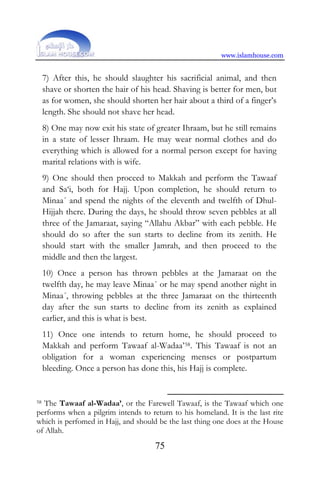
![www.islamhouse.com
76
The Worship of Allah
Know, dear brothers and sisters, that worship is obligatory upon
every Muslim who is mentally sane and has reached the age of
puberty. Performing these pillars of Islam is a means to enter
Jannah after receiving the Mercy of Allah (). The Prophet ()
once said to a bedouin who came and asked:
“ ‘O Messenger of Allah, tell me what Allah has obligated
upon me in terms of the prayer.’ He replied, ‘The five [daily]
prayers, except if you wish to perform some voluntary ones.’
He asked, ‘Tell me what Allah has obligated upon me in terms
of the fasting.’ He replied, ‘The month of Ramadaan, except if
you wish to perform some voluntary ones.’ He said, ‘Tell me
what Allah has obligated upon me in terms of Zakaah.’ [The
narrator] said ‘So the Messenger of Allah () informed him of
the legislations of Islam.’ The bedouin said, ‘By Him who has
honored you, I will not do any voluntary acts, and I will not
leave anything of what Allah has ordered me.’ The Messenger
of Allah () said, ‘He has succeeded (or, ‘He will enter
Jannah’) if he is saying the truth.’ ” (Bukhari)
The Individual and Social Effects of Worship
1) The believers will achieve happiness and success in the life of this
world as well as the Hereafter. Allah () says:
“Indeed whosoever purifies himself shall achieve success, [as
well as he who] remembers (glorifies) the Name of his Lord,
and prays.” [Surah al-A’laa (87):14-15]](https://image.slidesharecdn.com/enhowtobecomemuslim-171104225735/85/En-how-to_become_muslim-76-320.jpg)
![www.islamhouse.com
77
2) Physical and spiritual strength which results when one amiably
and privately converses with Allah. Allah () says:
“Truly, Allah is with those who fear Him (keep their duty unto
Him), and those who are muhsinoon (good-doers).” [Surah an-
Nahl (16):128]
3) The Help of Allah and establishing His believing slaves’ authority
on the earth. Allah () says:
“Verily, Allah will help those who help His (Cause). * Truly,
Allah is All-Strong, All-Mighty. Those (Muslim rulers) who, if
We give them power in the land, (they) order the
establishment of the Salaah, the paying of the Zakaah, and
they enjoin all good, and forbid all evil [i.e. they make the
Qur`an as the law of their country in all the spheres of life].
And with Allah rests the end of (all) matters (of creatures).”
[Surah al-Hajj (22):40-41]
4) The building of ties of brotherhood, cooperation, bonding, and
security between the individuals in an Islamic society. Allah ()
says:
“The believers, men and women, are awliyaa´ (helpers,
supporters, friends, protectors) of one another, they enjoin all
good, and forbid from all evil; they establish the Salaah and
give the Zakaah, and obey Allah and His Messenger. Allah
will have His Mercy on them. Surely Allah is All-Mighty, All-
Wise.” [Surah at-Tawbah (9):71]
5) The Guidance of Allah and the Success which is only granted by
Him. Allah () says:
“O you who believe! If you obey and fear Allah, He will grant
you Furqaan (a criterion to judge between right and wrong),](https://image.slidesharecdn.com/enhowtobecomemuslim-171104225735/85/En-how-to_become_muslim-77-320.jpg)
![www.islamhouse.com
78
and will expiate for you your sins, and forgive you.” [Surah al-
Anfaal (8):29]
6) An abundance of provision from Allah and way out of hardship.
Allah () says:
“And whosoever fears Allah and keeps his duty to Him, He
will make a way for him to get out (from every difficulty). *
And He will provide him from (sources) he never could
imagine.” [Surah at-Talaaq (65):2-3]
7) A multiplication of reward and expiation of sins. Allah () says:
“And whosoever believes in Allah and performs righteous
good deeds, He will remit from him his sins, and will admit
him to Gardens under which rivers flow (Paradise) to dwell
therein forever, that will be the great success.” [Surah at-
Taghaabun (64):9]](https://image.slidesharecdn.com/enhowtobecomemuslim-171104225735/85/En-how-to_become_muslim-78-320.jpg)
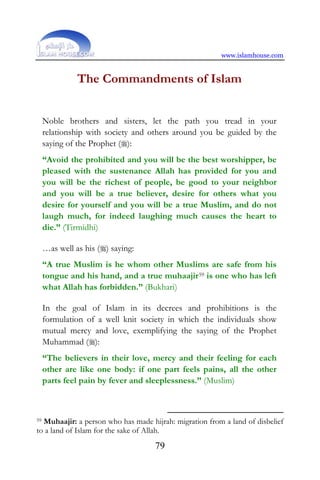
![www.islamhouse.com
80
There is no good value or manner except that Islam commands and
encourages it, and there is no baseness or lewdness in speech or
deed except that Islam warns against it and commands that it be
avoided. Islam commands the following things:
1) It commands one to believe in the Tawheed of Allah and forbids
associating partners with Him (shirk). Allah () says:
“Verily! Allah forgives not (the sin of) setting up partners in
worship with Him, but He forgives whom he pleases sins
other than that.” [Surah an-Nisaa´ (4):116]
The Prophet () said:
“Avoid the seven deadly sins.” They asked, “O Messenger of
Allah, what are they?’ He replied, “Associating partners
(shirk) with Allah, magic, killing someone who Allah has
forbidden without right, taking interest, consuming the wealth
of orphans, fleeing upon confronting the enemy in battle, and
accusing chaste women believers who are far removed from
committing any licentious acts.” (Bukhari)
2) It commands treating others well and forbids false
consummation of wealth, such as interest, theft, deception,
usurpation of property, and the like. Allah () says:
“O you who believe! Eat not up your property among
yourselves unjustly except it be a trade amongst you, by
mutual consent.” [Surah an-Nisaa´ (4):29]
3) It commands justice and equity and forbids all types of
oppression and transgression against others. Allah () says:
“Verily, Allah enjoins justice and al-Ihsaan [i.e. to be patient
in performing your duties to Allah, totally for Allah’s sake and](https://image.slidesharecdn.com/enhowtobecomemuslim-171104225735/85/En-how-to_become_muslim-80-320.jpg)
![www.islamhouse.com
81
in accordance with the Sunnah (legal ways) of the Prophet in a
perfect manner], and giving (help) to kith and kin; and forbids
all licentious acts, evil, and oppression, He admonishes you,
that you may take heed.” [Surah an-Nahl (16):90]
4) It commands that people cooperate in righteousness, and it
forbids that they cooperate in evil. Allah () says:
“Help you one another in righteousness and piety; and do not
help one another in sin and transgression. And fear Allah.
Verily, Allah is Severe in punishment.” [Surah al-Maa`idah (5):2]
5) It commands safeguarding life, and forbids killing and
participating in it by any means, except with due right. Allah ()
says:
“Because of that We ordained for the Children of Israel that if
anyone killed a person not in retaliation of murder, or (and) to
spread mischief in the land - it would be as if he killed all
mankind, and if anyone saved a life, it would be as if he saved
the life of all mankind. And indeed, there came to them Our
Messengers with clear proofs, evidences, and signs, even then
after that many of them continued to exceed the limits (e.g. by
doing oppression unjustly and exceeding beyond the limits set
by Allah by committing the major sins) in the land!” [Surah al-
Maa`idah (5):32]
Allah () also said:
“And whoever kills a believer intentionally, his recompense is
Hell to abide therein, and the Wrath and the Curse of Allah
are upon him, and a great punishment is prepared for him.”
[Surah an-Nisaa´ (4):93]](https://image.slidesharecdn.com/enhowtobecomemuslim-171104225735/85/En-how-to_become_muslim-81-320.jpg)
![www.islamhouse.com
82
6) It commands well-treatment of one’s parents and forbids that
one disobey them. Allah () says:
“And your Lord has decreed that you worship none but Him.
And that you be dutiful to your parents. If one of them or both
of them attain old age in your life, say not to them a word of
disrespect, nor shout at them but address them in terms of
honor . * And lower unto them the wing of submission and
humility through mercy, and say: ‘My Lord! Bestow on them
Your Mercy as they did bring me up when I was small.’ ”
[Surah al-Israa´ (17):23-24]
7) It commands joining ties of relation and forbids cutting them.
Allah () says:
“Would you then, if you were given the authority, do mischief
in the land, and sever your ties of kinship? * Such are they
whom Allah has cursed, so that He has made them deaf and
blinded their sight.” [Surah Muhammad (47):22-23]
The Prophet () said:
“One who cuts ties of relations will not enter Paradise.”
(Muslim)
8) It commands and encourages marriage. The Prophet () said:
“O youngsters! Whoever is able to get married let him do so,
for it lowers one’s gaze and keeps one chaste. Whoever is not
able, then let him fast, for indeed it acts like a shield for him.”
(Bukhari)
It forbids fornication and homosexuality and all things which lead
to it. Allah () says:](https://image.slidesharecdn.com/enhowtobecomemuslim-171104225735/85/En-how-to_become_muslim-82-320.jpg)
![www.islamhouse.com
83
“Say (O Muhammad ): ‘(But) the things that my Lord has
indeed forbidden are the fawaahish (great evil sins, every kind
of unlawful sexual intercourse, etc.) whether committed
openly or secretly, sins (of all kinds), unrighteous oppression,
joining partners (in worship) with Allah for which He has
given no authority, and saying things about Allah of which
you have no knowledge.’ ” [Surah al-A’raaf (7):33]
9) It orders the protection of the wealth of orphans and their well-
treatment, and it forbids consuming their wealth without right.
Allah () says:
“Verily, those who unjustly eat up the property of orphans,
they eat up only a fire into their bellies, and they will be burnt
in the blazing Fire!” [Surah an-Nisaa´ (4):10]
It forbids grieving and ill-treating them. Allah () says:
“Therefore, treat not the orphan with oppression.” [Surah ad-
Duhaa´ (93):9]
10) It orders that one be truthful in his testimony and forbids that
one bear false witness. The Prophet () said:
“Shall I not tell you the three greatest sins?” They said.
“Indeed O Messenger of Allah.” He said, “Associating
partners with Allah (shirk) and ill-treatment of parents.” He
was leaning [while he mentioned that], but then he sat up
straight (as if he was alarmed) and said, “..and bearing false
witness.” [The narrator] said, “He continued to repeat this
until we wished that he would stop.” (Bukhari)](https://image.slidesharecdn.com/enhowtobecomemuslim-171104225735/85/En-how-to_become_muslim-83-320.jpg)
![www.islamhouse.com
84
11) It commands that one fulfill his oaths and forbids that one
intentionally lie in one’s oath, especially if it were in order to deprive
another’s right. Allah () says:
“Verily, those who purchase a small gain at the cost of Allah’s
Covenant and their oaths, they shall have no portion in the
Hereafter (Paradise). Neither will Allah speak to them, nor
look at them on the Day of Resurrection, nor will He purify
them, and they shall have a painful torment.” [Surah Aali
‘Imraan (3):77]
12) It commands humans to take care of themselves and forbids
suicide, whether directly or indirectly, such as dealing with
intoxicants, drugs, cigarettes, and other things which modern
medicine has proven to be causes of destructive diseases. Allah ()
says:
“And do not kill yourselves (nor kill one another). Surely,
Allah is Most Merciful to you. * And whoever commits that
through aggression and injustice, We shall cast him into the
Fire, and that is easy for Allah.” [Surah an-Nisaa´ (4):29-30]
13) It commands truthfulness, trustworthiness, and that one fulfill
his oaths; and it forbids lying, deception and treachery. Allah ()
says:
“O you who believe! Betray not Allah and His Messenger, nor
betray knowingly your amaanaat (things entrusted to you, and
all the duties which Allah has ordained for you).” [Surah al-
Anfaal (8):27]
14) It commands love and unity, and it forbids that one disassociate
from others as well as all other things which lead to hate and](https://image.slidesharecdn.com/enhowtobecomemuslim-171104225735/85/En-how-to_become_muslim-84-320.jpg)
![www.islamhouse.com
85
enmity, such as bearing grudges, hatred, and envy. The Prophet ()
said:
“To not hate each other, do not envy each other, and do not
turn your backs on each other (cut off), but rather be true
slaves of Allah as brothers. It is impermissible for a Muslim to
cut off from his brother more than three days.” (Bukhari)
15) It commands generosity and forbids greed and stinginess. The
Prophet () said:
“There are two manners which Allah loves: good manners and
generosity, and there are two manners which Allah hates, bad
manners and stinginess. When Allah desires good for
someone, he uses him to fulfill the needs of others.” (Abu
Nu‘aim, al-‘Iraaqi)
16) It commands providence and forbids wastefulness and
squandering money uselessly. Allah () says:
“And give to the kindred his due and to the miskeen (poor)
and to the wayfarer. But spend not wastefully (your wealth) in
the manner of a spendthrift. Verily, spendthrifts are brothers
of the Shayateen (devils), and the Shaytaan (Devil, Satan) is
ever ungrateful to his Lord.” [Surah al-Israa´ (17):26-27]
17) It commands moderateness and forbids strictness and
extremism in religion. Allah () says:
“Allah intends for you ease, and He does not want to make
things difficult for you.” [Surah al-Baqarah (2):185]
The Prophet () said:](https://image.slidesharecdn.com/enhowtobecomemuslim-171104225735/85/En-how-to_become_muslim-85-320.jpg)
![www.islamhouse.com
86
“Be aware and stay away from extremism in religion, for
indeed the only thing which destroyed those before you was
extremism in religion.” (Saheeh ibn Hibbaan)
18) It commands humility and forbids pride and arrogance. Allah
() says:
“ ‘And be moderate (or show no insolence) in your walking,
and lower your voice. Verily, the harshest of all voices is the
voice (braying) of the ass.’ ” [Surah Luqmaan (31):19]
About pride, the Prophet () said:
“He who has even a mustard seed’s worth of pride in his heart
will not enter Jannah.” A person asked, “O Messenger of
Allah, people like to wear nice clothes and sandals.” He said,
“Indeed Allah is Beautiful and He loves beauty. Pride is that
one rejects the truth and sees others to be lower than himself.”
(Muslim)
The Prophet () said about self-conceit:
“Whoever drags his clothes on the ground out of self-conceit,
Allah will not look at him on the Day of Resurrection.”
(Bukhari)
19) It commands people to console others and not feel happy about
others’ grief. The Prophet () said:
“Do not feel happy about your brother’s grief, it might be that
Allah will show mercy to him and put you through a trial.”
(Tirmidhi)
20) It forbids Muslims from interfering into affairs which do not
concern them. The Prophet () said:](https://image.slidesharecdn.com/enhowtobecomemuslim-171104225735/85/En-how-to_become_muslim-86-320.jpg)
![www.islamhouse.com
87
“Indeed from the good traits of a true Muslim is that he leaves
that which does not concern him.” (Tirmidhi)
21) It commands respecting people and forbids debasing them and
holding them in contempt. Allah () says:
“O you who believe! Let not a group scoff at another group, it
may be that the latter are better than the former; nor let
(some) women scoff at other women, it may be that the latter
are better than the former. And do not defame one another,
nor insult one another by nicknames.” [Surah al-Hujuraat
(49):11]
22) It commands one to jealously protect and guard one’s
mahrams60, and it forbids cuckoldry. The Prophet () said:
“Three will not enter Jannah: one who maltreats his parents, a
cuckold, and women who act like men.” (Haakim)
23) It prohibits resembling members of the opposite sex. Ibn
‘Abbaas () said:
“The Messenger of Allah () cursed those men who make
themselves to resemble women and those women make
themselves to resemble men.” (Bukhari)
24) It commands that people exert efforts in doing good to others,
and it forbids that they remind them of their favors. The Prophet
() said:
60 Mahram: Those relatives who are forbidden for a person to marry due to
their closeness in blood, marriage, or due to wet-nursing, such as mothers,
mothers in law, wet-nurses, sisters, aunts, etc.](https://image.slidesharecdn.com/enhowtobecomemuslim-171104225735/85/En-how-to_become_muslim-87-320.jpg)
![www.islamhouse.com
88
“Be warned and stay away from reminding people of your
favors to them, for indeed it causes ungratefulness [in the one
to whom the favor was shown] and extinguishes the reward
[he would have received for that deed].” Then he recited
Allah’s () saying,
“O you who believe! Do not render in vain your Sadaqah
(charity) by reminders of your generosity or by injury.” [Surah
al-Baqarah (2):264]61
25) It commands thinking good about others, and it forbids spying
and backbiting. Allah () says:
“O you who believe! Avoid much suspicion, indeed some
suspicion is sin. And spy not, nor backbite one another.
Would one of you like to eat the flesh of his dead brother? You
would hate it (so hate backbiting). And fear Allah. Verily,
Allah is the One Who accepts repentance, Most Merciful.”
[Surah al-Hujuraat (49):12]
26) It commands that one guard his tongue from all evil talk, and
that he use it in that which leads to good, whether to the individual
or the society, such as mentioning Allah and reform. It forbids us
from letting our tongues loose without any benefit. The Prophet
() said:
“May your mother bereave you O Mu‘adh!62 Are people
thrown into the Hellfire on their faces or nostrils except for
what their tongues reaped?” (Tirmidhi)
61 Narrated by Dhahabi in ‘Al-Kabaa`ir’.
62 This is an Arabic expression of condemnation in which the literal meaning is
not intended.](https://image.slidesharecdn.com/enhowtobecomemuslim-171104225735/85/En-how-to_become_muslim-88-320.jpg)
![www.islamhouse.com
89
27) It commands with well-treatment of the neighbor and forbids
showing them harm. The Prophet () said:
“By Allah he is not a true believer! By Allah he is not a true
believer! By Allah he is not a true believer!” It was said, “And
who is he, O Messenger of Allah?” He replied, “Him whose
neighbor is not safe from his evil.” (Bukhari)
28) It commands that one seek company with the righteous and
forbids that one seek company with the evil. The Prophet () said:
“The example of a righteous and evil companion is like one
who carries perfume and another who is a blacksmith. As for
the one who carries perfume, he will either give you some
perfume, you might buy some, or [at least] you will find a
pleasing scent with him. As for the blacksmith, either he (the
blacksmith) will burn his clothes, or he will find a hideous
odor from him.” (Bukhari)
29) It orders people to strive to bring harmony to any disunity
amongst people, and it prohibits anything which leads to enmity
and hatred. Allah () says:
“There is no good in most of their secret talks save (in) him
who orders Sadaqah (charity in Allah's Cause), or ma’roof
(Islamic Monotheism and all the good and righteous deeds
which Allah has ordained), or conciliation between mankind,
and he who does this, seeking the good Pleasure of Allah, We
shall give him a great reward.” [Surah an-Nisaa´ (4):114]
30) It orders that people be sincere to each other [by advising them]
and forbids that advice be withheld when it is sought. The Prophet
() said:](https://image.slidesharecdn.com/enhowtobecomemuslim-171104225735/85/En-how-to_become_muslim-89-320.jpg)
![www.islamhouse.com
90
“The religion is sincerity.” We asked, “To whom?” He
replied, “To Allah, to His Book, to His Messenger, and to the
leaders of the Muslims and their general folk.” (Muslim)
31) It orders people to help relieve worries of Muslims, to give
them respite [in paying back debts], and to conceal their faults. The
Prophet () said:
“Whoever relieves some worry of a believer, Allah will relieve a
worry of his on the Day of Judgment. Whoever makes things
easy for one in times of hardship [by giving respite to one who
is not able to pay back a debt], Allah will makes things easy
upon him in this life and the next. And whoever conceals the
faults of a Muslim, Allah will conceal his fault in this life and
the Hereafter. Allah helps his servant as long as he helps his
brother.” (Muslim)
32) It orders that one have patience and fortitude in times of
hardship, and forbids that one become worried and discontent.
Allah () says:
“And certainly, We shall test you with something of fear,
hunger, loss of wealth, lives and fruits, but give glad tidings to
the patient ones. * Who, when afflicted with calamity, say:
‘Truly! To Allah we belong and truly, to Him we shall return.’
* They are those on whom are the Blessings (etc.) from their
Lord, and (they are those who) receive His Mercy, and it is
they who are the guided-ones.” [Surah al-Baqarah (2):155-157]
33) It orders that one forgive, pardon, and turn away from one who
does evil to him, and forbids that one seek revenge and retribution.
Allah () says:](https://image.slidesharecdn.com/enhowtobecomemuslim-171104225735/85/En-how-to_become_muslim-90-320.jpg)
![www.islamhouse.com
91
“And hurry to (that which leads to) forgiveness from your
Lord, and for Paradise as wide as are the heavens and the
earth, prepared for the Muttaqoon (the pious, Allah-fearing).
* Those who spend [in Allah’s Cause - deeds of charity, alms,
etc.] in prosperity and in adversity, who repress anger, and
who pardon men; verily, Allah loves the muhsinoon (the good
doers).” [Surah Aali ‘Imraan (3):133-134]
34) It commands mercy and it forbids cold-heartedness. The
Prophet () said:
“Allah shows mercy to those who show mercy. Show mercy to
those on earth, He Who is above the heavens will show mercy
to you.” (Tirmidhi)
35) It commands kindness and softness, and it forbids harshness
and strictness. The Prophet () said:
“Nothing is done with kindness except that it is beautified,
and nothing is devoid of kindness except that it is disfigured.”
(Muslim)
36) It commands that one return evil with good, and forbids that
one reciprocate evil with the same. Allah () says:
“And the good deed and the evil deed cannot be equal. Repel
(the evil) with one which is better (i.e. Allah ordered the
faithful believers to be patient at the time of anger, and to
excuse those who treat them badly): then verily he, between
whom and you there was enmity, (will become) as though he
was a close friend.” [Surah Fussilat (41):34]
37) It commands the spreading of knowledge and forbids hiding it.
The Prophet () said:](https://image.slidesharecdn.com/enhowtobecomemuslim-171104225735/85/En-how-to_become_muslim-91-320.jpg)
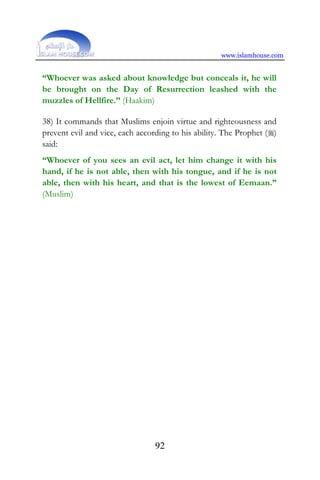
![www.islamhouse.com
93
Various Prohibitions
Some of the things which Islam forbids are the following:
1) Wine, and all other drugs which come under this heading,
whether it is ingested, inhaled or injected. Allah () says:
“O you who believe! Intoxicants (all kinds of alcoholic
drinks), gambling, al-ansaab (Stone altars on which the
polytheists slaughtered to their idols), and al-azlaam (arrows
for seeking luck or decision) are an abomination of the
Shaytaan’s handiwork; so avoid (strictly all) that
(abomination) in order that you may be successful. * The
Shaytaan wants only to excite enmity and hatred between you
with intoxicants (alcoholic drinks, etc.) and gambling, and
hinder you from the remembrance of Allah and from the
Salaah (the prayer). So, will you not then abstain?” [Surah al-
Maa`idah (5):90-91]
2) Eating the meat of carrion, pigs, and all other things mentioned
in Allah’s () saying:
“Forbidden to you (for food) are: al-maytah (dead animals -
cattle-beast not slaughtered), blood, the flesh of swine, and
the meat of that which has been slaughtered as a sacrifice for
others than Allah, or has been slaughtered for idols, etc., or on
which Allah’s Name has not been mentioned while
slaughtering, and that which has been killed by strangling, or
by a violent blow, or by a headlong fall, or by the goring of
horns - and that which has been (partly) eaten by a wild
animal - unless you are able to slaughter it (before its death)
and that which is sacrificed (slaughtered) on nusub (stone
altars). (Forbidden) also is to use arrows seeking luck or](https://image.slidesharecdn.com/enhowtobecomemuslim-171104225735/85/En-how-to_become_muslim-93-320.jpg)
![www.islamhouse.com
94
decision, (all) that is fisq (disobedience of Allah and sin).”
[Surah al-Maa`idah (5):3]
3) Eating that over which the Name of Allah was intentionally not
pronounced, or that over which other than the Name of Allah was
pronounced upon slaughtering. Allah () said:
“Eat not (O believers) of that (meat) on which Allah’s Name
has not been pronounced (at the time of the slaughtering of
the animal), for sure it is fisq (a sin and disobedience of
Allah).” [Surah al-An‘aam (6):121]
4) Eating those animals which have canine teeth, such as lions,
leopards, wolves and the like, as well as those birds which have
talons, like eagles, falcons, hawks and the likes. Ibn ‘Abbaas said:
“The Prophet () forbid us from [eating] any carnivorous
animal which has canine teeth, and every bird which has
talons [with which it catches its prey].” (Muslim)
5) What was slaughtered by other than the Jews and the Christians.
It is considered carrion and it is impermissible to eat.
“Made lawful to you this day are all good and pure things.
The food (slaughtered cattle, eatable animals, etc.) of the
people of the Scripture (Jews and Christians) is lawful to you
and yours is lawful to them. The food (slaughtered cattle,
eatable animals, etc.) of the people of the Scripture (Jews and
Christians) is lawful to you and yours is lawful to them.”
[Surah al-Maa`idah (5):5]
6) Any food or drink which is apparently harmful to one’s body,
such as cigarettes and similar things, are impermissible. Allah ()
says:](https://image.slidesharecdn.com/enhowtobecomemuslim-171104225735/85/En-how-to_become_muslim-94-320.jpg)
![www.islamhouse.com
95
“And do not kill yourselves (nor kill one another). Surely,
Allah is Most Merciful to you.” [Surah an-Nisaa´ (4):29]
7) Wearing of silk, gold, and silver for men; they are permissible for
women. The Prophet () said:
“The wearing of silk and gold has been permitted for the
women of my nation but not its men.” (Ahmad)
It is not allowed, though, for both males and females, to eat, drink,
or perform wudoo´ from utensils made from either gold or silver,
for the Prophet () said:
“Do not drink from gold or silver utensils and do not eat from
its plate for indeed it is for them (the kuffaar) in this life and
for us in the next.” (Bukhari)](https://image.slidesharecdn.com/enhowtobecomemuslim-171104225735/85/En-how-to_become_muslim-95-320.jpg)
![www.islamhouse.com
96
Selected Supplications, Words of
Remembrance, & Islamic Etiquettes
1) Mention the name of Allah [by saying ‘Bismillaah’] before you
start eating or drinking, and thank Allah [by saying ‘Alhamdulillaah
(Allah praise and thanks be to Allah)’] upon finishing. You should
eat from what is in front of you [and not from in front of someone
else], and eat with your right hand, for the left hand is mainly used
to clean what is held detestable (like cleaning oneself after relieving
himself). ‘Umar bin Abi Salamah () said: “When I was a young
boy, I was in the room of the Messenger of Allah (), and my hand
[was taking food from] all sides of the plate [while eating]. So the
Messenger of Allah () said to me:
‘Young boy, mention the name of Allah [before you start to
eat], eat with your right hand, and eat from in front of you.’ ”
(Bukhari)
2) Never find fault in food, however unpleasant it may be. Abu
Hurairah () said:
“The Messenger of Allah () never found any fault in food. If
he liked it he ate it, and if he did not he left it.” (Bukhari)
3) Do not enter houses except after seeking permission [by
knocking or the like]. Allah () says:
“O you who believe! Enter not houses other than your own,
until you have asked permission and greeted those in them.”
[Surah an-Noor (24):27]](https://image.slidesharecdn.com/enhowtobecomemuslim-171104225735/85/En-how-to_become_muslim-96-320.jpg)
![www.islamhouse.com
97
Do not persist in seeking permission [more than thrice]. The
Prophet () said:
“One should seek permission thrice. If you are granted
permission, [then enter,] and if not, go back.” (Muslim)
5) Greet all Muslims, whether you know or do not [by saying ‘As-
Salaamu ‘alaykum], due to the love and friendship which it brings
about. The Prophet () said:
“You will never enter Jannah until you believe, and you will
never believe fully until you love each other. Shall I not lead
you to something that if you do it, you will love each other?
Spread the greetings of ‘Salaam’ amongst yourselves.”
(Muslim)
6) If someone greets you with Salaam, return him with the same
greetings or one better.63 Allah () says:
“When you are greeted with a greeting, greet in return with
what is better than it, or (at least) return it equally.” [Surah an-
Nisaa´ (4):86]
7) When you feel like yawning, you should try to stop it as much as
possible. The Prophet () said:
“Yawning is from the Shaytaan. When one of you feels like
yawning, let him stop it as much as he can. And if one of you
sighs, “Aahh!” [while doing so], the Shaytaan laughs.”
(Bukhari)
63 When someone says “As-Salaamu alaykum,” one should respond with, “wa
‘alaykum As-Salaam,” at the very least. It is better that one add, “wa
Rahmatullaah,” and even further, “wa Barakaatuh.”](https://image.slidesharecdn.com/enhowtobecomemuslim-171104225735/85/En-how-to_become_muslim-97-320.jpg)
![www.islamhouse.com
98
If he is unable to stop it, he should cover his mouth with his hand.
The Prophet () said:
“If one of you yawns, then let him hold his mouth with his
hand, for indeed the Shaytaan enters [it].” (Muslim)
8) When you sneeze, say, “Alhamdulillaah.” If another Muslim
sneezes and says, “Alhamdulillaah,” you should reply by saying,
“Yarhamuk-Allahu (may Allah have mercy on you).” If
someone replies to you by saying, “Yarhamuk-Allahu,” reply to
him by saying, “Yahdeekumullaah wa yuslihu baalakum (may
Allah guide you and make improve your heart, your living,
and your affairs).”
“When one of you sneezes, let him say, ‘Alhamdulillaah,’ and
then let his brother or companion say to him, ‘Yarhamuk-
Allahu,’ and then let him (the one who sneezed) say,
‘Yahdeekumullaah wa yuslihu baalakum.’ ” (Bukhari)
If a disbeliever says, “Alhamdulillah,” you should reply by saying,
“Yahdeekumullaah wa yuslihu baalakum,” only.64 Abu Musa
() said:
“The Jews would try to make themselves sneeze while in the
company of the Prophet () hoping that he would say,
‘Yarhamukumullaah’. Instead, he would say,
‘Yahdeekumullaah wa yuslihu baalakum’.” (Tirmidhi)
From its manners is what Abu Hurairah () related, that when the
Messenger of Allah sneezed, he would put his hand or his clothes in
front of his mouth and lower his voice [in doing so].
64 A person should refrain from saying, “God bless you,” or any other
supplication other than what the Prophet () made.](https://image.slidesharecdn.com/enhowtobecomemuslim-171104225735/85/En-how-to_become_muslim-98-320.jpg)
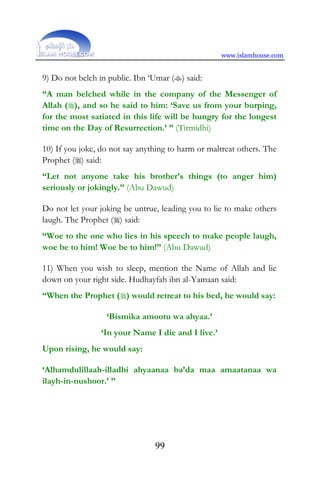
![www.islamhouse.com
100
“All praise and thanks be to the One who brought us to life
after having caused us to die,65 and to Him will we be
resurrected. (Bukhari)
12) Before having marital relations with your wife, say:
“Bismillaah. Allahumma jannibnash-Shaytaan, wa jannib-ish-
Shaytaana maa razaqtanaa.”
“In the Name of Allah. O Allah, keep the Shaytaan away from
us, and keep the Shaytaan away from what you grant us [from
offspring].” (Bukhari)
The Prophet () said:
“If someone says when he approached his wife (before sexual
intercourse), ‘In the Name of Allah. O Allah, keep the
Shaytaan away from us, and keep the Shaytaan away from
what you grant us [from offspring],’ if Allah grants them a
child he (the Shaytaan) will not harm him.” (Bukhari)
Also, keep whatever takes place between you and your partner
private. The Prophet () said:
“Indeed from the worst stations of people on the Day of
Resurrection is one who has marital relations with his wife
and then spreads her private matters.” (Muslim)
65 Sleep is a lesser form of death, as Allah says in the Qur`an:
“It is Allah Who takes away the souls at the time of their death,
and those that do not die when their sleep. He keeps those
(souls) for which He has ordained death and sends the rest for a
term appointed. Verily, in this are signs for a people who think
deeply.” [Surah az-Zumar (39):42]](https://image.slidesharecdn.com/enhowtobecomemuslim-171104225735/85/En-how-to_become_muslim-100-320.jpg)
![www.islamhouse.com
101
13) Upon leaving your home, say the corresponding supplication.
The Prophet () said:
“Whoever says, meaning upon leaving one’s home:
‘Bismillaahi, tawakkaltu ‘alAllahi, laa hawla wa laa quwwata
illaa billaah.’
‘In the Name of Allah, I put my trust in Allah, There is no
ability nor might except with Allah.’
…it will be said to him, ‘Your affair has been taken care of,
your have been protected [from all evil], and the Shaytaan
moves away from you.” (Tirmidhi)
14) When you visit the ill, invoke the supplication which has been
narrated of the Prophet (). When he would visit the ill, he would
sit close to his head and say the following seven times:
“Asalullaah al-‘Adheem, Rubb al-‘Arsh il-‘Adheem an
yashfiyak.”
“I beseech Allah, the Magnificent, the Lord of the
Magnificent Pedestal, that He cure you.”
The Prophet () said:
“If Allah has written for him to live longer, he will be cured
from this sickness.” (Saheeh ibn Hibbaan)
15) When you enter the toilet, enter with your left foot and say:
“Bismillah Allahumma inni a‘oodhu bika min al-kubthi wal-
khabaa`ith.”
“In the Name of Allah, O Allah, indeed I seek refuge in you
from filth and the evil Jinns.” (Bukhari)
When you leave the toilet, exit with your right foot and say:](https://image.slidesharecdn.com/enhowtobecomemuslim-171104225735/85/En-how-to_become_muslim-101-320.jpg)

![www.islamhouse.com
103
Brotherly Advice
1) Know that upon entering the fold of Islam, Allah has wiped away
all yours previous sins and evil deeds. The Prophet () said:
“Do you not know that Islam wipes away what comes before
it?” (Muslim)
Rather, even the evil deeds which you committed before you
entered Islam are changed into good deeds by the Bounty of Allah.
Allah () says:
“And those who invoke not any other ilaah (god) along with
Allah, nor kill such life as Allah has forbidden, except for just
cause, nor commit illegal sexual intercourse and whoever does
this shall receive the punishment. * The torment will be
doubled to him on the Day of Resurrection, and he will abide
therein in disgrace. * Except those who repent and believe (in
Islamic Monotheism), and do righteous deeds, for those, Allah
will change their sins into good deeds, and Allah is Oft-
Forgiving, Most Merciful.” [Surah al-Furqaan (25):68-70]
Listen to this good news from Allah (): those who embrace this
religion from the People of the Book will be given a double reward
due to their belief in their Messenger and their belief in the
prophethood of Muhammad ()! Allah () says:
“Those to whom We gave the Scripture [i.e. the Tawraah and
the Injeel, etc.] before it, - they believe in it (the Qur`an). And
when it is recited to them, they say: ‘We believe in it. Verily, it
is the truth from our Lord. Indeed even before it we have been
from those who submit themselves to Allah in Islam as
Muslims (like ‘Abdullah bin Salaam and Salmaan al-Faarisi,](https://image.slidesharecdn.com/enhowtobecomemuslim-171104225735/85/En-how-to_become_muslim-103-320.jpg)
![www.islamhouse.com
104
etc).’These will be given their reward twice over, because they
are patient, and repel evil with good, and spend (in charity)
out of what We have provided them.” [Surah al-Qasas (28):52-
54]
The Prophet () said:
“Whoever accepts Islam from the people of the two Books
(the Jews and Christians), they will have a double reward. The
will receive the rights we enjoy, and they must give the rights
we give. And whoever accepts Islam from the pagans [other
than them], will have their reward, and they will receive the
rights we enjoy, and they must give the rights we give.”
(Ahmad)
Your records are white and clean, so be careful not to commit any
bad deeds and try to keep your records white and clean, and
continually seek repentance for any mistakes you make.
2) You now know the truth, so try to set a portion of your time to
understand your religion by seeking beneficial knowledge from
authentic sources. The Messenger of Allah () said:
“If Allah desires good for a person, He gives him
understanding of the religion.” (Bukhari)
Make seeking knowledge of ‘Aqeedah (the Islamic belief system)
your first priority, and then study everything else you need in your
daily life to keep your religion upright, such as Purification, Prayer,
and the likes. You should also study the rulings of trade, monetary
transactions, and social interaction, as well as the rulings pertaining
to your source of livelihood so that you do not unintentionally fall
into things which are impermissible. Also, set out a portion of your
time to memorize the Book of Allah.](https://image.slidesharecdn.com/enhowtobecomemuslim-171104225735/85/En-how-to_become_muslim-104-320.jpg)
![www.islamhouse.com
105
You should understand your religion from its proper and trusted
sources- the Book of Allah and the authentic Sunnah of His
Messenger (). Let the Messenger of the religion, Muhammad (),
be your role model and leader and learn his biography so you can
follow role. Try as much as possible to accompany the scholars and
students of knowledge who practice what they preach, and know
that not all of those who say they are Muslims should be trusted in
knowledge; rather, you must make sure and carefully examine those
who you take your knowledge from or read, by comparing them
with the Book of Allah and the Sunnah of His Messenger,
Muhammad (), and his rightly guided successors. The Prophet ()
said:
“I advise you to have taqwaa67, hearing and obeying even if it
be to an Ethiopian slave with amputated limbs (if he be your
leader). For indeed, whoever lives long amongst you will see
many differences. So stick to my Sunnah, and the Sunnah of
the rightly guided successors. Hold tight and cling on to it
with your molar teeth. And stay far away from newly invented
matters [in religion], for indeed every invented matter is an
innovation, and every innovation is misguidance.” (Saheeh ibn
Hibbaan, Abu Dawood)
Whatever is in accordance with his Sunnah, then take it, and
whatever opposes it, leave it. The Prophet () said:
“The Jews split into seventy-one sects, one is in Jannah and
seventy are in the Hellfire. The Christians split into seventy-
two sects, seventy-one are in the Hellfire and one is in Jannah.
By Him in Whose Hands is the soul of Muhammad, my
67 To have taqwaa means to shield yourself from the punishment of Allah by
avoiding sins and doing deeds of righteousness.](https://image.slidesharecdn.com/enhowtobecomemuslim-171104225735/85/En-how-to_become_muslim-105-320.jpg)
![www.islamhouse.com
106
Ummah (nation) will split into seventy-three sects, one will be
in Jannah and seventy-two will be in the Hellfire.” It was said,
“O Messenger of Allah, who are they?” He answered, “The
Jamaa‘ah68.” (ibn Maajah)
3) Love and enmity. You must love and ally with the believers, and
you must hate the disbelievers and take them as enemies. But to
hate them does not mean to oppress and transgress against them or
usurp their rights. You should not hate them merely for their selves,
but rather due to their disbelief and misguidance. This should
encourage you to do your utmost to help save them from the
Hellfire. Do not prefer disbelievers over Muslims, and do not help
them against Muslims. Allah () says:
“The believers, men and women, are awliyaa´ (helpers,
supporters, friends, allies, protectors) of one another.” [Surah
at-Tawbah (9):71]
4) Know that there are usually none who enter Islam except that
they face opposition, disagreement and harm, especially from those
closest to them. You should keep this in mind and know that
through this is an elevation of your level, a purification of sins, and
a test through which Allah is trying you to see the extent of your
truthfulness and steadfastness on your religion. Allah () says:
“Do people think that they will be left alone because they say:
‘We believe,’ and will not be tested? * And We indeed tested
those who were before them. And Allah will certainly let it (it)
be known (the truth of) those who are true, and will certainly
let (it) be known (the falsehood of) those who are liars.” [Surah
al-‘Ankaboot (29):2-3]
68 Jamaa‘ah: The general body of the Sahaabah and those who follow them.](https://image.slidesharecdn.com/enhowtobecomemuslim-171104225735/85/En-how-to_become_muslim-106-320.jpg)
![www.islamhouse.com
107
Also, the Prophet () was asked:
“Which people are the most tested?” He replied, “The
Prophets, then the righteous, then those after them, and then
those after them. Every person is tried according to the
strength of his religion, if his religion is strong, he is tested
more, and if his religion is weak, his trial is lessened. A person
continues to be tested and tried until he walks on the earth
totally free of sin (due them being forgiven through trials).”
(Ahmad)
Know that they will try to make you doubt in Islam and constantly
mention these doubts to you. So try as much as possible to ask the
people of knowledge so that you may find a proper reply to those
doubts, from the Qur`an and the Sunnah of the Prophet ().
5) Calling to the religion of Allah (da’wah) and his authentic
Sunnah. You must be knowledgeable to what you call to. Know the
doubts that the enemies of Islam instigate about it so that it will be
easy for you to answer them. Let the way you do da’wah be led the
saying of Allah ():
“Invite (mankind, O Muhammad ) to the Way of your Lord
(i.e. Islam) with wisdom (i.e. with the Divine Inspiration and
the Qur`an) and fair preaching, and argue with them in the
best way. Truly, your Lord knows best who has gone astray
from His Path, and He is the Best Aware of those who are
guided.” [Surah an-Nahl (16):125]
Try as much as possible to help save others from the Hellfire, just
as Allah saved you from it, and start with those closest to you.
Always keep this saying of the Prophet () in front of you:](https://image.slidesharecdn.com/enhowtobecomemuslim-171104225735/85/En-how-to_become_muslim-107-320.jpg)
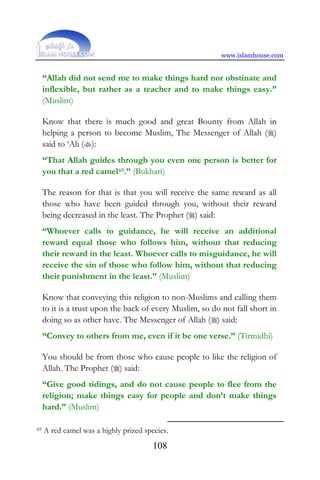
![www.islamhouse.com
109
Know that in calling others to Islam you are not responsible for the
results, for your call is restricted to merely clarifying and showing
people the way to the truth. Allah () says:
“And verily, you (O Muhammad ) are indeed guiding
(mankind) to the Straight Path (i.e. Allah’s religion of Islamic
Monotheism). * The Path of Allah, to Whom belongs all that
is in the heavens and all that is in the earth. Verily, all the
matters at the end go to Allah (for decision).” [Surah ash-
Shooraa (42):52-53]
As for the Guidance to actually practice Islam, that is from Allah
only. Allah () says:
“Verily! You (O Muhammad ) guide not whom you like, but
Allah guides whom He wills. And He knows best those who
are the guided.” [Surah al-Qasas (28):56]
6) Try as much as possible to choose righteous companions who
encourage and help you to do good, warn and prevent you from
doing evil, and will be a support for you in your life after Allah. The
Prophet () said:
“The example of a righteous and evil companion is like one
who carries perfume and another who is a blacksmith. As for
the one who carries perfume, he will either give you some
perfume, you might buy it, or [at least] you will find a pleasing
scent with him. As for the blacksmith, either he (the
blacksmith) will burn his clothes, or he will find a hideous
odor from him.” (Bukhari)
7) Be careful not to go to extremes in the religion. There is neither
extreme asceticism nor fanaticism in the religion. One should act
according to the saying of Allah ():](https://image.slidesharecdn.com/enhowtobecomemuslim-171104225735/85/En-how-to_become_muslim-109-320.jpg)
![www.islamhouse.com
110
“Allah intends for you ease, and He does not want to make
things difficult for you.” [Surah al-Baqarah (2):185]
Anas bin Maalik () said:
Three people came to the houses of the wives of the Prophet
() asking about the worship of the Prophet (). When they
were informed, they thought it was too little [for them] and
said, “Who are we in comparison to the Prophet (), for
indeed Allah has forgiven him whatever he did in the past as
well as the future.” One of them said, “As for me, I will pray
the whole night.” Another said, “I will fast every day without
rest,” and yet another said, “I will stay away from women and
never marry.” The Messenger of Allah () came [and when he
heard of this, he] said, “Are you the people who said such and
such? As for me, by Allah, indeed I am the most fearing of
Allah and most protective of not earning his punishment from
amongst you, but I fast and I eat, I pray and I sleep, and I
marry women. Whoever desires other than my Sunnah, then
he is not from me.” (Bukhari)
On the other hand, there should be no shortcoming or softening in
regards to the rulings of the religion. The Prophet () said:
“Leave me to what I have ordered you. Indeed those before
you were destroyed due to their [persistent] questioning, and
opposing their Prophets. If I forbid you from something, stay
far away from it, and if I command you with something, do as
much as it is possible.” (Bukhari)
8) You will see many Muslims who fall short in fulfilling the
obligations and refraining from the prohibitions of the religion. You
will see that they fall short in da’wah as well. The extent to which
one fall short differs from person to person, but it is all due to the](https://image.slidesharecdn.com/enhowtobecomemuslim-171104225735/85/En-how-to_become_muslim-110-320.jpg)
![www.islamhouse.com
111
fact that Shaytaan is trying his utmost to misguide the children of
Adam. Allah () says:
“[Iblees (Satan)] said: ‘By Your Might, then I will surely
mislead them all.’ ” [Surah as-Saad (32):82-83]
He threatened that he would exert all his efforts in misleading them.
Allah () says:
“And surely, We created you (your father Adam) and then
gave you shape (the noble shape of a human being), then We
told the angels, ‘Prostrate to Adam’, and they prostrated,
except Iblees (Satan), he refused to be of those who prostrate.
* (Allah) said: ‘What prevented you (O Iblees) that you did
not prostrate, when I commanded you?’ Iblees said: ‘I am
better than him (Adam), You created me from fire, and him
You created from clay.’ * (Allah) said: ‘(O Iblees) get down
from this (Paradise), it is not for you to be arrogant here. Get
out, for you are of those humiliated and disgraced.’ * (Iblees)
said: ‘Allow me respite till the Day they are raised up (i.e. the
Day of Resurrection).’ * (Allah) said: ‘You are of those
allowed respite.’ * (Iblees) said: ‘Because You have sent me
astray, surely I will sit in wait against them (human beings) on
Your Straight Path. * Then I will come to them from before
them and behind them, from their right and from their left,
and You will not find most of them as thankful ones (i.e. they
will not be dutiful to You).’ * (Allah) said (to Iblees) ‘Get out
from this (Paradise) disgraced and expelled. Whoever of them
(mankind) will follow you, then surely I will fill Hell with you
all.’ ” [Surah al-A’raaf (7):11-18]
Do not let this discourage you from fulfilling the obligation of
da’wah to the religion of Allah, and let this be your biggest incentive
to try your hardest in serving this religion and calling to it.](https://image.slidesharecdn.com/enhowtobecomemuslim-171104225735/85/En-how-to_become_muslim-111-320.jpg)
![www.islamhouse.com
112
9) Adorn yourself with the manners of Islam and apply them in
your daily life, such as helping someone who is in need whether you
know him or not and smiling at your brothers. The Prophet ()
said:
“Smiling at your brother is regarded as charity, enjoining
good and prohibiting evil is charity, showing someone the
way when he is lost is charity, helping the weak-sighted is
charity, removing a rock, a thorn, or bones from the path is
charity, and pouring water from your bucket into the bucket of
your brother is charity. (Saheeh ibn Hibbaan)
Your clothes and all your things should be clean. A Muslim must
always be clean, for his religion is one of cleanliness. Allah () says:
“O Children of Adam! Take your adornment (by wearing your
clean clothes), while praying.” [Surah al-A’raaf (7):31]
Islam stresses that a person differ from other religions and their bad
habits. The Prophet Muhammad () said:
“Clean your courtyards, for indeed the Jews do not clean their
courtyards.” (Suyooti)
You should try to do as many good deeds as possible, such as giving
charity, performing voluntary prayers and others.
When one performs these deeds [mentioned above] they are giving
indirect da’wah to the Muslims, in that others will try as well to
implement these manners. Through them one gives da’wah to the
non-Muslims as well, in that they become interested to learn about
this religion which calls to cleanliness and good character.
Treat your relatives well, and do not cut ties with them even if they
are opposed to you accepting Islam. Your relations should be even](https://image.slidesharecdn.com/enhowtobecomemuslim-171104225735/85/En-how-to_become_muslim-112-320.jpg)
![www.islamhouse.com
113
better than before so that they might come to like your new way of
life. They will come to know that Islam only improved your good
relations and manners. Asmaa´ () said:
“My mother, who was a pagan during the life of the
Messenger of Allah (), came to me, and so I asked the
Messenger of Allah (): ‘My mother came to me wanting [to
meet me]. Should I keep ties with my mother?’ He () said:
‘Yes, keep your ties of relation with your mother.’ ” (Bukhari)
10) Know that the struggle between good and evil will continue
until the Final Hour. The weakness of the Muslims and the material
strength of the disbelievers, the minority of Muslims and the
majority of the disbelievers, the backwardness of the Muslims and
the advancement of the disbelievers, the decrepitness of the
Muslims and the might and honor of the disbelievers; none of these
things indicate the falsity of Islam. Rather, they are definite results
of the shortcomings of the Muslims in implementing the legislation
of their Lord and their abandoning righteous deeds and calling to
Allah. ‘Umar ibn al-Khattaab (), the second Khaleefah (successor)
to the Prophet () said:
“We are a people who Allah honored and gave might through
Islam. If we were to seek this honor in something else, Allah would
humiliate us. The truth has most right to be followed, for indeed
Allah created Heaven and Hell, and He has promised that each one
will be filled.”
11) Know my brothers and sisters that we are in the last of times
(the Last Day is near), and that each year that passes, we become
closer to the end of the world and the establishing of the Hour. The
Prophet () said:
“ ‘I myself and the Hour have been raised like these two,’ and
he joined his index and middle fingers.” (Bukhari)](https://image.slidesharecdn.com/enhowtobecomemuslim-171104225735/85/En-how-to_become_muslim-113-320.jpg)
![www.islamhouse.com
114
The Prophet () foretold the state of Islam [and Muslims] in this
time. He () said:
“Islam started as a strange thing, and it will again be like it
was before: strange. So may glad tidings be to the strangers.”
(Muslim)
Having many followers is not a proof for the correctness of a
methodology. Allah () said:
“And if you obey most of those on earth, they will mislead you
far away from Allah's Path.” [Surah al-An‘aam(6):116]
Also, the Prophet () said:
“Glad tidings to the strangers! Glad tidings to the strangers!
Glad tidings to the strangers!” Someone asked, “Who are the
strangers O Messenger of Allah?” He said, “Righteous people
amongst many evil ones. Those who disobey them are more
than those who obey.” (Ahmed)
He also clarified the state in which the Muslim who holds on to his
religion will be, and the various restrictions he will face [in
practicing his religion], whether physical or psychological. The
Prophet () said:
“Enjoin the good and forbid the evil, but when you see that
greed is obeyed, desires followed, the life of this world playing
its affect on people, and that people are pleased with their own
opinions, stick to yourselves and leave commanding the
general public with good, for indeed there will be days after
you, having patience in them is like grasping a hot coal. One
who does righteous deeds in them will receive the reward of
fifty people doing the same deed.” (Saheeh ibn Hibbaan)](https://image.slidesharecdn.com/enhowtobecomemuslim-171104225735/85/En-how-to_become_muslim-114-320.jpg)

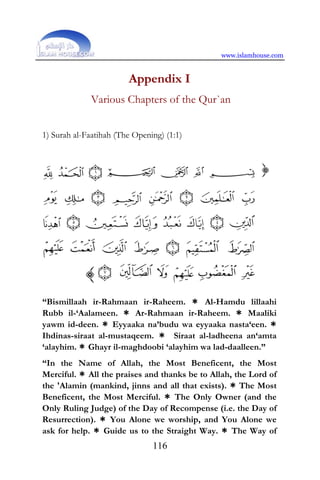
![www.islamhouse.com
117
those on whom You have bestowed Your Grace, not (the way)
of those who earned Your Anger, nor of those who went
astray.”
2) Surah al-Ikhlaas (The Purity 112:1-4)
“Qul Huw-Allaahu Ahad. * Allaah us-Samad. * Lam yalid,
walam yoolad. * Wa lam yakul-lahu kufuwan ahad.”
“Say [O Muhammad (Peace be upon him)]: He is Allah, [the]
One. * Allah-us-Samad (The Self-Sufficient Master, Whom all
creatures need while He is not in need of them). * He begets
not, nor was He begotten. * And there is none co-equal or
comparable unto Him.”
3) Surah al-Falaq (The Daybreak 113:1-5)](https://image.slidesharecdn.com/enhowtobecomemuslim-171104225735/85/En-how-to_become_muslim-117-320.jpg)
![www.islamhouse.com
118
“Qul a‘oodhu bi Rabb-il-falaq. * Min sharri maa khalaq. *
Wa min sharri ghaasiqin idhaa waqab. * Wa min sharrin-
naffaathaati fil-‘uqad. * Wa min sharri haasidin idhaa hasad.”
“Say: I seek refuge with [Allah] the Lord of the daybreak. *
From the evil of what He has created. * And from the evil of
the darkening (night) as it comes with its darkness (or the
moon as it sets or goes away). * And from the evil of the
witches when they blow in the knots; and from the evil of the
envier when he envies.”
4) Surah an-Naas (Mankind 114:1-6)
“Qul a‘oodhu bi Rabb in-naas. * Malik in-naas. * Ilaah in-
Naas. * Min sharr il-waswaas il-khannaas. * Aladhi
yuwaswisu fee sudoor in-naas. * Min al-jinnati wan-naas.”
“Say: I seek refuge with [Allah] the Lord of mankind. * The
King of mankind. * The deity of mankind. * From the evil of
the whisperer (devil who whispers evil in the hearts of men)
who withdraws [from his whispering in ones heart after one
remembers Allah]. * Who whispers in the breasts of mankind.
Of jinns and men.”](https://image.slidesharecdn.com/enhowtobecomemuslim-171104225735/85/En-how-to_become_muslim-118-320.jpg)

![www.islamhouse.com
120
deeds, and recommend one another to the truth and
recommend one another to patience.”
7) Ayat-ul-Kursi (The Verse of the Pedestal) [Surah al-Baqarah (The
Cow (2):255]
“Allaahu laa ilaaha illaa huw al-Hayy ul-Qayyoom. Laa
ta´khudhuhoo sintataw wa laa nawm. Lahu maa fis-
samaawaati wa maa fil-ard. Man dhal-ladhee yashfa‘u ‘indahu
illaa bi idhnih. Ya’lamu maa bayna aydeehim wa maa
khalfahum. Wa laa yuheetoona bi shay`im min ‘ilmihee illaa
bimaa shaa´. Wasi‘a kursiyuhus-samaawaati wal-ard. Wa laa
ya`ooduhu hif-dhuhumaa wa huwal-‘Aliyy ul-Adheem.”
“Allah! None has the right to be worshipped but He, the Ever
Living, the One Who sustains and protects all that exists.
Neither slumber, nor sleep overtake Him. To Him belongs
whatever is in the heavens and whatever is on earth. Who is he
that can intercede with Him except with His Permission? He](https://image.slidesharecdn.com/enhowtobecomemuslim-171104225735/85/En-how-to_become_muslim-120-320.jpg)
